#to having him prove in maybe the most unambiguous possible way that when it comes down to it she means more to him than his revenge
Text
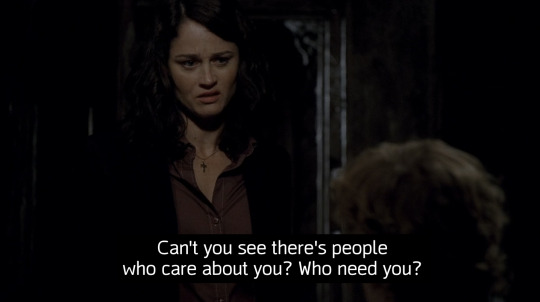
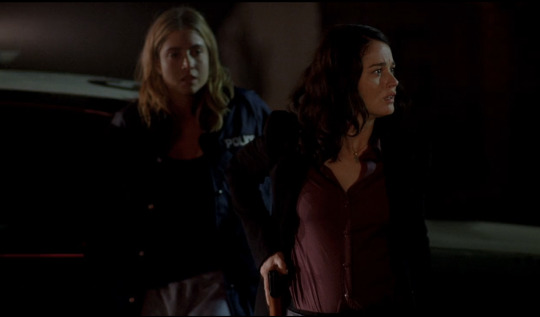
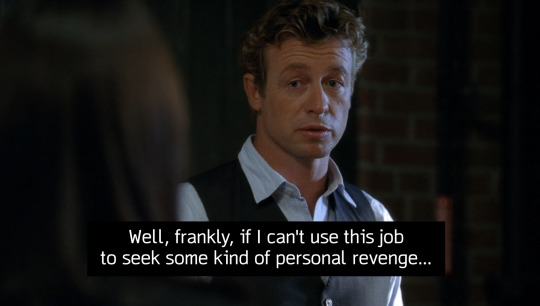
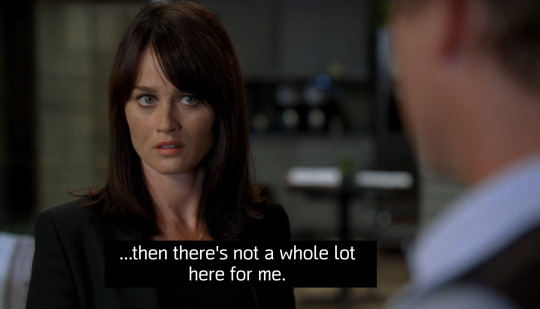
you ever just
#just makes me a little#she goes from essentially begging him to stay alive for the people who care about him (for her)#to having him prove in maybe the most unambiguous possible way that when it comes down to it she means more to him than his revenge#to him looking right at her and saying pretty much the exact opposite#the whiplash but also idk the words vs actions...#more than words he couldn't express his feelings with words so he did it another way#his actions have always shown his truth but she needs his words she needs to hear it from him she needs to know he understands it too#brings me back to s6 (what doesn't tbh) - all their missed opportunities all the times they were interrupted or couldn't find the words#how much weight is given to those words even though at this point it's clear to everyone around them and the audience and even to THEM#(even if they only just realize the full reality of it) how they feel about each other something about the showing and the telling of it#you can't imagine how good that feels to say out loud i needed to get to this and you deserve to hear it did you mean what you said#yes i meant what i said every word of it SAY IT AGAIN#and then little yellow house when it's again clearly such a big deal - to lisbon especially but to them both - for her to SAY it#idk i just love it i love a show that gives me endless opportunities to annoyingly and gleefully overanalyze#tm
15 notes
·
View notes
Text
A very confused Star Wars Fan desperately tries to justify their belief that “Caravan of Courage” shows the way forward for the franchise. No, really.
Ever since I was a little kid, I’ve loved Star Wars. And I mean, all of it. The books, the games, the Lego, the spin-offs: I even enjoy the Holiday Special in a The Room so-bad-you-just-need-to-see-it sort of way. But particularly the films. But here is when we run into the big problem: I’m just the wrong age. The original trilogy launched before I was born, the prequel trilogy hit cinemas when I was already a teen and while I went and saw them and enjoyed them, I was at that age where I was self-conscious about seeing a “kids” film, and hyper-aware of how silly and cringy those films were in parts.
So my indoctrination, my inoculation with the Star Wars bug didn’t happen in the cinema, and it didn’t happen with any of the main franchise works. It happened on home video, on a skiing trip in the French Alps in the early 90’s. I’d have been about 6, and this was the first time I’d ever been abroad other than to see relatives in Ireland. And I loved it: to this day I love skiing, but more than that, I have very, very fond childhood memories of this trip. This was shortly before I lost my biological mother to cancer, she’d have received her diagnosis just after we got back from the trip. This was when my younger sister stopped being an annoying screaming thing and became and became an actual person I could talk and play and share ideas with, this was before the combination my mothers long illness and my father having just launched his own IT start up meant I didn’t see him or her any more, despite the fact they were in the same house as me. This was this wonderful, nostalgic child-hood bubble when my family was intact, and nothing could ever go wrong.
I skied all day with mum and dad, and would come back to the chalet in the evening. It was an English speaking chalet, I met my first real-life American there, and having grown up in the 90’s in the UK nothing was cooler than making friends with an actual American my own age. He had a hulk Hogan action figure with springs in the legs so if you put him on a hard surface and punched his head down, when you let go he’d jump really high in the air. We used to play with it together in the bath, back in that weird 90’s time-bubble when it was possible to convince two sets of parents that this kid you’d just met was you best friend in the world and of course shared bath time was, somehow, normal and appropriate. And fresh from bath time, tired from the day, the parents would give us some hot coco, dump us kids in front of the tv and grab the first shitty low-budget VHS they could find to keep us distracted while they went to the bar. In this particular time, in this particular place, that shitty low budget cartoon was the complete set of the 1985 Lucasfilm/ABC Ewoks cartoon, plus the two spin off movies, and to this day that cheap, kitschy, kind of bad series has a special warm and cosy place in my heart. I remember being enthralled by the world, in love with the characters, applied by the bad guys and the injustice they caused (to this day I’m still irate about that time Wicket lost his set of beads documenting his progress towards becoming a full warrior and the older Ewoks basically said, tough, you need to re-earn all those merit badges from scratch. This struck me as exactly the sort of bullshit an adult would pull, and pissed me off) and on tenterhooks about what would happen to the characters.
It was also, by a coincidence, the first ever Star Wars media I was exposed to, and the above combination of events probably explains a lot about me.
So I was surprised, the other day, when scrolling Disney+, to find they’d added Caravan of Courage AND Battle for Endor to the roster in my region. Surely Disney wouldn’t want their slick, cool brand associated with this old trash? Surely there could be no place for this in the post-Mandalorian Star Wars cannon? Surely this is a horrible mistake some intern made, right?
Unless…. What if I’ve miss-remembered? What if it’s not just rose-tinted nostalgia goggles, and it’s, in fact, secretly really, really good?
I rushed to my comfy chair, got a blanket, dimmed the lights, made some coco (with rum in it, because why the hell not?) and sat down to re-examine this lost gem.
And wow: it’s every bit as shit as you’d expect.
It has aged exactly as poorly as you’d expect a cheap, mid 80’s direct to video spin-off to age. Caravan of Courage? More like Caravan of Garbage, am I right?
And yet… I still enjoyed every moment.
And it was sitting there, in my pyjamas, watching a cheaply made direct to video cash-grab from just before I was born, seeing it again for the first time in nearly 30 years, and I realised something.
It doesn’t really matter if this film is bad, so long as I enjoy it. And if it doesn’t really mater if this is bad, then I, like many Star Wars fans, wasted a huge amount of time and emotional effort on being butthurt about stuff I didn’t like about the Rise of Skywalker and it’s ilk. Because somewhere, right now, a tired and frustrated parent is putting Disney+ on to keep their kids quiet for two hours. And they won’t think too hard about what they put on, so long as it keeps little Timmy busy for a bit. Somewhere, right now, a kid is watching Rise of Skywalker, and it’s the first Star Wars media they’ve ever seen.
And that’s okay. Because we don’t know what that kids home life is like. We don’t know if it’s good or bad. Maybe it’s great, maybe it’s about to take a dramatic plunge like mine did, and this moment here will be the cosy, warm memory they look back on in 30 years time, and that’s beautiful. They’re getting introduced to a fun, wonderful fantasy world that could be with them all their lives, through good times and bad, and as fans we should be happy about that.
Star Wars will never, die: it’s too darn profitable, Disney will never let it. And while I hope they learn from their mistakes and make sure every future Star Wars is a timeless gem of story-telling, statistically, if you keep making enough films, some of them will be bad. And while I’d like them all to be great, it’s still okay if they’re bad.
Because nothing can take away my memories of that week in that chalet. Nothing can take-away my memories of when they put the original trilogy on in cinemas for the special edition and I had my jaw hit the floor with how good it was on the big screen, not knowing or caring who shot first. Nothing can take away you memories of the Original Trilogy, the Prequels, or the Clone Wars. Nothing can tarnish the bits of the sequil trilogy that you like, and there are good bits in there.
But wait, what about continuity? What about the sacred, perfect written time-line that used to exist?
Well, what about it? Have you seen any other big, epic fantasy universe before? They’re all a mess. A work of fiction, particularly fantasy, can be extensive, or tightly written, but not both. Harry Potter is only seven books, and the last two feel, tonally, like they’re from an entirely different series. I love them, but the grim-dark kicked in so fast you’ll get whiplash. The Hobbit is a perfect written self-contained novel, and LOTR is *The* big boy high-fantasy trilogy: fast forward 50 years, and Christopher Tolkien is desperately squeezing every last drop of money out of his father’s corpse by finishing and publishing every unfinished note JRR ever wrote right down to his shopping lists. Even Dune goes of the rails with sequels. I can only think of four fantasy works that are both extensive and consistently tightly written, Song of Ice and Fire, Wheel of Time, Malazan: Book of the Fallen and Brandon Sanderson’s Cosmere universe. And even then, the prequels and spin-offs mess with the timelines: the Dunk and Egg novella’s change some character’s canonical ages and timelines, Wheel of Time was going slowly off the rails even before the Jordan died, Forge of Darkness made what was a good metaphor for the creation of it’s world into a literal war deep in the past, and Sanderson’s first Novel Elantris got a re-write to bring it more in line with the rest of the shared universe. The MCU, oft held up as the modern example of tightly planned, well thought out ongoing storytelling, is a lie: it was never as pre-planned out as Disney wants us to think; the first Iron Man, apparently, barely had a script, with Downey ad-lib-ing most of his scenes. None of the MCU films are direct sequels to each-other other than Infinity war and Endgame. There are three Iron Man films, and Three Thor films, and none continue an ongoing story line across multiple films, and the Cap films barely continue an arc, but only where Cap’s relationship with Natasha and Bucky is involved. Much like these, Star War’s cannon is a complete, nightmarish, confusing, tangled, illogical mess. And it has been since 1984, as Caravan of Courage proves. It was never consistent and well planned.
And that’s okay.
I used to care about plot holes. I used to care about which works were cannon in Star Wars lore. I’m over that now. I’m happy to imagine the books, films and games not as a blow-by-blow historical account of a galaxy far far away, but as campfire stories from within this fun, imaginative world that we’re all invited to listen to. Stories that are in-universe myth and folklore, that we can all snuggle up and listen to while drinking highly alcoholic rum and remembering better times, knowing that wherever the future throws at us, no matter how the world goes to hell around us, we’ll still have the memories, and the ability to make our own new stories in the wonderful Star Wars world we all share.
And that’s okay. No, more than that: that’s beautiful.
Also Star Wars is completely unambiguous on the fact we’re allowed to kill fascists no matter how many times they keep coming back with a new logo, so that’s timely I guess.
So, there’s my hot take two-years after everyone else stopped caring about this stuff, as per bloody usual. Tell me why I’m wrong below, and does anyone else have any truly awful spin-off shows that they kind of have a nostalgic soft spot for?
#star wars#ewoks#caravan of courage#Star wars universe#epic fantasy#MCU#tolkien#LOTR#malazan#song of ice and fire#wheel of time#brandon sanderson#Cosmere#dune#late opinions delivered badly#i'm wrong and i know it#seriously hot coco with rum#spin off#bad spin off#so bad it's good#I love the ewoks cartoon#but you don't have to thats okay too
14 notes
·
View notes
Text
Unorganised thoughts on Trails in the Sky: The 3rd
I had a twelve hour marathon session to finish it yesterday, why no, I don’t have a social life, why do you ask?
What an ending!
That horrible thing happened where I find a final boss really hard and then I look up the game afterwards and everyone’s going on about how easy it was and I’m like :/
I’m not good at video games
I can’t believe the game starts with Kevin SPOILING THE END OF CARNELIA, damnit it Kevin, I never read it because I missed some chapters in FC and was planning on reading it when I replayed
I read it in the garden. It’s pretty good
I love the doors thing so much. The main plot was like... fine, as an excuse to have a game, but I would honestly have bought this if it were nothing but just a bunch of these little vignettes. Shows how good the characters are
Really enjoyed Schera and Estelle’s Moon Doors, and the Star Doors about Olivier, Julia, the one at the banquet, Zin’s (surprsingly, as I’ve always found him kinda dull), the Ravens (MY BOYS), Campanella breaking the fourth wall, and Bleublanc.
I hated all of the minigames except the quiz. I like quizzes
I did not finish the Nightmare Arena. I kept a save if I ever feel like going back and trying, but I probably won’t
Special mention: Fucking hell Star Door 15 do I have to say more
I figured that at most it was going to be an abusive, or maybe negligent parents thing, not...
I take back my previous comments about not caring for Renne
I resent the ‘win x battles’ doors because I’m the kind of player who skips encounters whenever possible, so I ended up having to grind in Abyss for hours - and the reward is very little, really >:(
I guess I have shipping opinions now?
Joshua and Estelle are still good and I like them very much
Kevin and Ries as friends, thanks
I had kind of jokingly been shipping Maybelle and Lila already, but Star Door 9 has made me militant
Am I the only person who ships Kloe and Josette a little? It would be cute!
The game pushes Olivier and Schera, which I don’t hate but like. She’s way too good for him. Her Moon Door kind of made me like her with Aina, actually, more than anything else
Speaking of Olivier, I don’t necessarily ship him with Mueller, but one thing I noticed about them that I thought was very sweet is that despite Mueller’s usual frustration at Olivier’s flirtations, he doesn’t seem to take any issue with Olivier calling him ‘love’. It’s a nice, subtle indication that there is mutual affection there, really. I don’t know. It made me smile
I like Mueller and Julia together as well. Except for the fact that their names sound awful next to each other
They had a lot of time to hang out on the bench...
So, uh. Tita and Agate. Why. Like, in the first two games it was very much a pseudo-sibling relationship, and then we meet Erika who seems pretty convinced it’s something far... worse, and you know what? That’s understandable. If I had a thirteen year old daughter and I’d been informed that in my absence she had become close friends with an adult man I didn’t know, I would be pretty damn concerned
But Anelace?!? Who knows Agate and knows he’s a good person and still seems to think their relationship is romantic?!? And she’s supportive!?!
‘She just has a dark sense of humour’ I whisper into my paper bag
I mean, not to Age Gap Discourse, but no. Bad. What the hell. She’s unambiguously a child
The saving grace is that, at the very least, it seems like this is just everyone else’s misunderstanding of the situation. Which is good, because I really, really like Agate and wouldn’t want to have to start despising him (perhaps a case could be made for Tita having a crush. As far as I’m concerned, that’s perfectly fine - as long as it isn’t reciprocated)
Anyway rant over
It’s so weird how every chapter is pretty short and supplemented by doors, except 6 which takes approximately 15 years
I do like how blatantly Falcom was wringing every last bit of usage possible out of all the old assets
I started yelling GILBERT everytime he appeared, god he’s such a loser I LOVE him
I loved being able to play as Richard so much. He’s genuinely my favourite antagonist in the whole series so far. He just had the most interesting motivations to me (and I’m a huge sucker for redemptions)
I wish it had been clearer that I wouldn’t be able to do a team reshuffle for the final boss, because I took my four best characters (Kevin, Estelle, Joshua and Richard) and made them Team Leaders, with the intention of then using them all together for the final fight. Which I of course couldn’t do. So I got stuck with underequipped glass cannon Tita in that final arena. Remarkably, she survived
I didn’t tear up at the end you can’t prove it
So Crossbell is of course next, but after a few hours of messing around with translation patches and corrupted zip files and that one doujin website where you can buy it but it’s all in Japanese, I have come to the conclusion that I’m not going to be able to play it unless we get an official localisation
But what I have found is a Let’s Play! Which is definitely not ideal, but it’s that or no Crossbell at all for me. So my plan is that I’ll watch that, and also play the first two Cold Steel games concurrently, as I’m told that’s okay. Should all be interesting
#trails series#trails in the sky#trails in the sky the third#trails in the sky 3#gonna miss these guys :(
12 notes
·
View notes
Text
RWBY Recaps: “With Friends Like These”
I was on a vine kick last night because what better way to waste your time and stay up horrendously late then by watching compilations of six-second absurdity? Which reminded me that this gem exists:
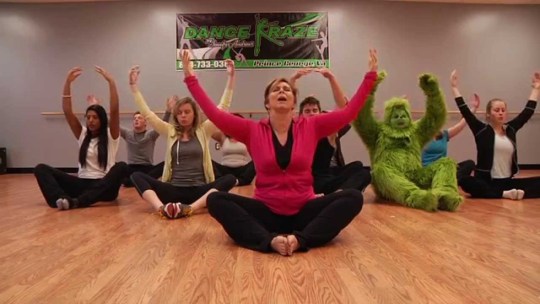
“Release all the sounds trapped in your mind” only for the grinch to let out this demonic, very relatable screech. That’s me right now, folks. That sound? It’s emanating from my soul.
I don’t even know how to provide a summary of my feelings unless you all are interested in watching this vine on a loop. So let’s just drop straight into the plot.
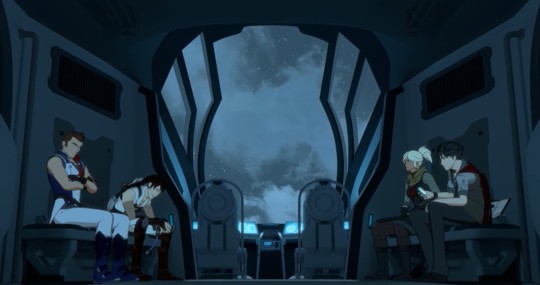
We start with a black screen, Ruby’s voice-over repeating the message she sent out at the end of last episode, then opening onto the airship with Qrow, Clover, Robyn, and Tyrian. The group doesn’t waste any time. They jump straight into making terrible, idiotic choices that go against their established characterizations. Despite the fact that Robyn announced she had seriously misjudged Ironwood mere hours ago, she immediately takes up Team RWBY’s simplistic stance of, “We can’t let him do this!” Granted, Robyn doesn’t have all the context information that the group does, such as precisely how depleted their tropes are and that the perimeter may have already been taken out. Nevertheless, she just went through an arc wherein she expected the worst of Ironwood---you’re doing something horrific with that tower!---only to be proven horrendously wrong and admit that she’d been wrong. Robyn just held his hand, semblance activated, while he asked Mantle to stand with him in this fight. Like when the group was heading back to Ironwood’s office, Robyn isn’t inclined to even consider that Ironwood might have a good reason for making these decisions. The group as a whole has a habit of jumping straight to, “He’s betraying us??” rather than, “Wow. Shit. Something must have happened back there that I’m not aware of. Because Ironwood has absolutely demonstrated that he never does anything without good reason. I must be missing some crucial piece of this situation if he’s suddenly declaring Martial Law.” (Which, I’d like to point out, is a temporary situation in response to an emergency... which this very much is. Characters and fandom alike are acting as if Ironwood has declared himself King of Atlas or something.) It comes down to the issue of the whole volume: one of trust. No one but the Ace Ops has put any trust in Ironwood, despite Ironwood actually working to earn that trust. A sharp contrast to the Volume 5 group who demanded Ozpin’s secrets without proving their loyalty first. Ironwood does what they couldn’t, proving his loyalty to them time and time again, only to get none of it in return. These people aren’t even willing to consider the possibility that maybe he has a good reason for making these calls. It’s not the outcome they want and is, therefore, “proof” of his antagonist status.
So all Robyn’s growth in regards to Ironwood is immediately erased. Literally in her first line. Despite the fact that Clover starts to remind her of this, defending this assumption that Ironwood is just a crazy doing evil, crazy things (that’s Tyrian btw), but of course he’s interrupted. His scroll chimes, revealing the arrest warrant out on RWBYJNROQ.
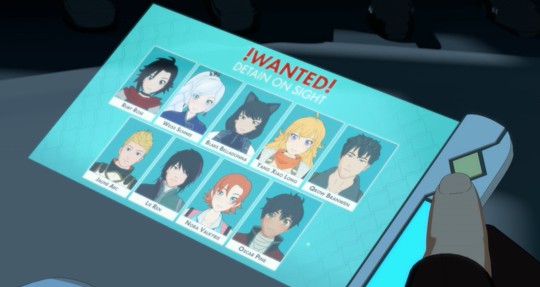
Now, I’ve seen a lot of people freaking out about this image since it dropped yesterday, using it as more evidence for how cruel and unfair Ironwood is. “What’s he got against Oscar? Or Qrow? See! He’s just gunning for all of them, regardless of whether they did anything wrong.” Except that Ironwood isn’t stupid. (When the writing remembers that he’s not, anyway.) He is well aware that this group is a unit. They’re joined at the hip. Once Ruby decides something that’s it, everyone follows. Ironwood’s goal coming into all this was never to arrest them. The only reason he decided on that course of action is because Team RWBY made it crystal clear that would work to keep him from saving Atlas at the expense of Mantle. Thus, what he’s aiming for is not truly “Arrest these people” but “Keep these people from standing in my way,” which Ironwood simply can’t accomplish if only Team RWBY is in custody. He knows very well that there are five other people out there who will immediately take up their cause. This might have been a different situation if Ruby herself hadn’t announced across all their scrolls that this is Ironwood’s plan and we have to stop him. That was unambiguously a call to arms: stop him like we’re trying to stop him now. So yes, Ironwood is absolutely going to put out an arrest for Qrow and Oscar as well. He doesn’t know Oscar’s situation with Neo. He doesn’t know that Qrow would be faithful to him---and indeed he’s absolutely not.
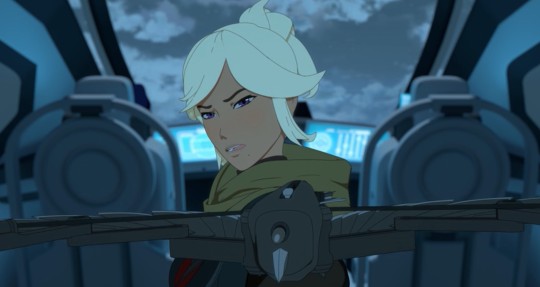
As Qrow begins stoking his own anger, Robyn moves from a character I legitimately liked and rooted for to someone I wasn’t at all sad to cut out of the episode via unconsciousness. She’s straight up arrogant here, labeling Ironwood’s choice as an “inhuman plan” despite not knowing what that plan is or why it’s necessary, following that up with, “Looks like he underestimated me again.” Look, I’m not inclined to be all polite and peace-keeping in this recap---RWBY hasn’t earned that---so there’s going to be a lot of salt this time around. I just want to give everyone fair warning in case that’s not your cup of tea. That established, I want to be blunt in saying: get over yourself, Robyn. This has nothing to do with you. She acts as if it’s a personal slight, as if rather than making the hard call to try and save as many people as he can, Ironwood spent last episode twirling his non-existent mustache and thinking up nefarious plans specifically to slight her. The fandom wants to talk about unstable characters? That’s Robyn here. Ironwood might shout and look terrified, but he’s taking the time to think through his actions before implementing them, considering each option before deciding on what he believes is the solution best suited to their survival. Robyn might seem calm and confident, but she’s jumping to conclusions and is the first to raise her weapon, threatening Clover while he’s attempting to approach this issue peacefully. It reminds me of that point in regards to arguments: just because someone is emotional doesn’t mean they’re wrong and just because someone can keep calm doesn’t mean they’re right. Robyn puts on a good show, but she’s more interested in maintaining her former, simplistic view of Ironwood---I knew he was out to get me!---and perceiving personal attacks against her, rather than grappling with what’s actually happening or, heaven forbid, getting more information before aiming an arrow at Clover’s head.
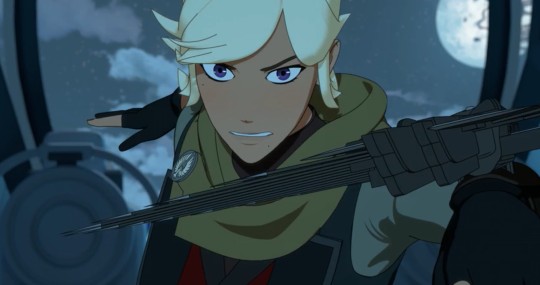
As Qrow joins her in being pissed I have to ask... did he just forget who Salem is?
Because Ruby announced that. “Salem is coming.” I love how the writing just has all the characters ignore what is the most crucial part of this entire dilemma. Team RWBY doesn’t get to spout generic “We can do it!” without acknowledging, let alone finding a way to circumvent, the issue of an immortal sorceress bearing down on them. Same with Qrow here. If anything he should be the most inclined to prioritize what’s actually important in this situation, considering that he’s known about Salem for far longer and has an even better picture of what she’s capable of. But he just ignores it too. Rather then recognizing that Clover doesn’t want to arrest him but has a responsibility to, that Ironwood may well have very good reasons for doing this considering Qrow doesn’t know what the hell his kids have been up to while he’s away, that now is not the time to join in Robyn’s fight when Salem herself is approaching, that allowing himself to be arrested would likewise allow him to speak to Ironwood like he wants to, given how sympathetic Clover is to him and would no doubt take him straight to Ironwood if he asked... Qrow, like the rest of the RWBYJNR group, decides that fighting is the only answer.
It comes down to maturity, something our heroes simply don’t have. Regardless of literal ages they act like children throwing tantrums. The second they don’t get precisely what they want they jump to violence as their solution. If you don’t adhere to my whim then I will fight you until you either agree (Cordovin) or are too injured to stop me (the Ace Ops). No, Yang, you don’t have to fight every single battle that comes your way. Especially when this group is creating those battles in the first place. No one made them launch an attack on Argus in the form of first stealing military property and then choosing to attack Cordovin when she gave them the option of surrendering. No one made them plant themselves in front of Ironwood and give the verbal/body language equivalent of announcing that Ironwood will have to forcibly move them if he wants to succeed. And then when he does that the writing and the fandom act like Ironwood attacked out of the blue, rather than accepting the gauntlet that Team RWBY threw down. They’re violent. They’re callous. They’re arrogant. In two volumes we haven’t seen them display an ounce of compassion or humility towards those not in their little circle, from renouncing the adults in their lives, to ignoring Ozpin, to betraying Ironwood left and right and then acting like he still owes them anything. These people are not heroes and Qrow is very quickly joining them.
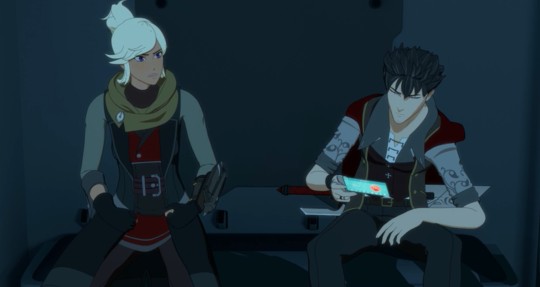
I find it hilariously ironic that last week people were screaming over how Ironwood is “Doing precisely what the villains want,” as if it’s possible to make hard, morally complex calls like this without creating division. Salem’s win there is inevitable. It is straight up impossible for Ironwood to do ANYTHING that doesn’t create some kind of discord among the people and his allies. He decides to leave Mantle? Team RWBY is upset. Stick around for a suicide mission? Ace Ops are upset. Refuse to make a decision and demand that someone else shoulder this weight for once? Everyone is upset because how dare you, you’re our leader. It’s a rigged setup---which is precisely why Salem is so hard to beat---so people need to stop acting like Ironwood had an out here that he simply refused to take. But I’m getting off track. That response is hilarious because you know who does do precisely what the villains want while actually having the option not to?
Robyn and Qrow.
Tyrian is literally sitting there laughing over this “show” and hoping that they’ll fight, giving him the chance to escape. He says as much. Please fight. To which Robyn responds, “He’s right. Let’s get this over with” and shoots at Clover.
“He’s right.”
“HE’S RIGHT.”
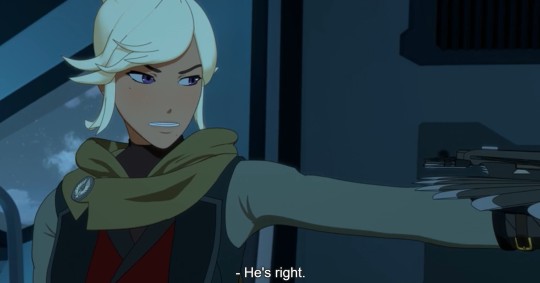
I don’t know how much more on-the-nose it can be. The villain clearly expresses what he wants to happen, a supposed hero verbally agrees with him, and then does that exact thing. But sure. Ironwood is the one playing into the villains’ hands. All of which doesn’t even touch on Qrow willingly teaming up with Tyrian later on, but we’ll get to that.
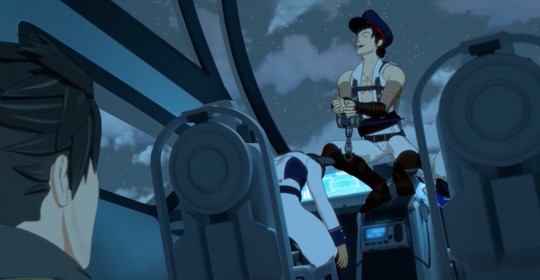
Obviously during the ensuing fight Tyrian does get free (who would have thought...) and kills the pilot of the ship. So congratulations, Robyn. Your supposed desire to defend the people just got one of them needlessly killed. That was entirely preventable and extending responsibility past the actual murderer, it’s on her that this guy died.
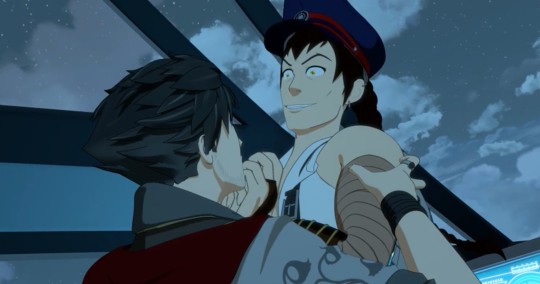
The airship begins to crash and Qrow... randomly freaks out about it? I’m endlessly confused by character strength in the show. Jumping out of airships is a repeated activity that’s treated as a game. We just watched the group nonchalantly leaving a burning, plummeting, also-had-a-grimm attached to it airship at the beginning of the Mantle battle, but now suddenly one crashing is this super big deal? That Qrow is going to panic about? That manages to take out Robyn? Okay...
Anyway they crash and we segue to Winter. And I just have to say: god bless Winter Schnee.
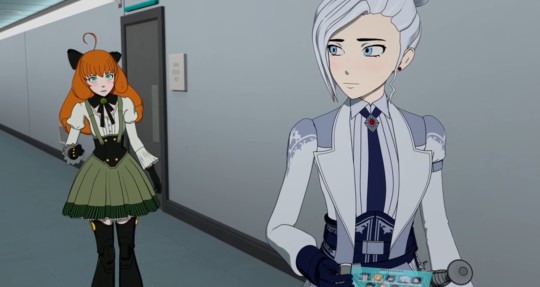
FINALLY someone with some common sense. As soon as Winter sees the arrest warrant she asks herself, “Weiss... what did you do?” Because yeah! They did do something! Winter is the only character who acknowledges that maybe, just possibly, our precious Team RWBY messed things up. That they’re capable of making mistakes. Unlike Robyn and Qrow she doesn’t jump to, “Oh my god you’re arresting my sister?” but rather keeps her head and acknowledges that if the general who has done nothing but treat her sister with respect and compassion since she arrived now wants her in custody... he probably has a damn good reason for that. This is a switch from the start of the volume when Winter reamed out the guards for putting Weiss in handcuffs rather than first seeing why she was chained up in the first place, but it’s a switch I’m here for.
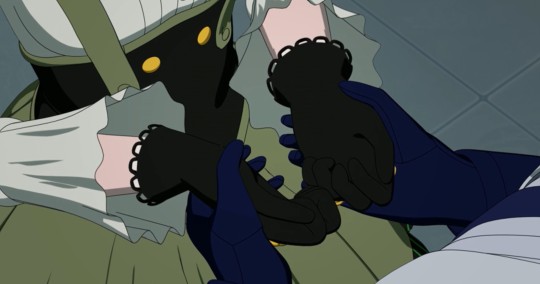
She and Penny then get into a conversation about choices and demonstrations of grief. Winter points out what I’ve been arguing for the last week: just because someone doesn’t waste time sobbing over a hard decision doesn’t mean it doesn’t hurt them to make it, and just because a decision is hard doesn’t mean it’s not the right call under these circumstances. “The general is making hard choices so that we don’t have to. For the good of all, not just the few,” Winter says and I want to reach right through my computer screen and give her a kiss for being the one compassionate, level-headed character right now. Penny, however, isn’t convinced. “I do not see what is good about any of this,” she says, rejecting Winter holding her hands in a way she didn’t reject Ruby doing it (surprise, surprise). It’s notable though that Winter responds with, “On that we can agree.” That right there is the kicker. Just because you’ve chosen the best of two options doesn’t mean either option is good. It just means one is less shitty. Winter is perfectly willing to admit that there’s nothing actually good in this situation, but she likewise admits that Ironwood isn’t wrong for shouldering the lesser evil so that no one else has to. That’s the sort of nuanced perspective we deserved from Team RWBY.
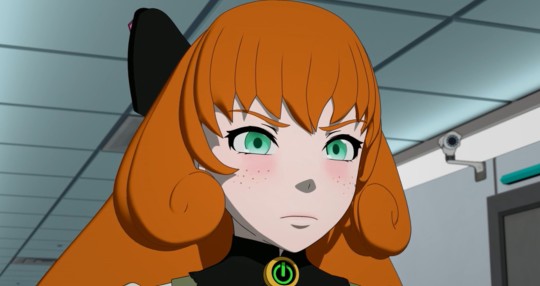
Instead, they’re insisting on a perfect happy ending in a world that they know damn well doesn’t allow for that. There’s a difference between being hopeful and striving for an “impossible” outcome when feasible, vs. allowing that “It’s a perfect ending or nothing” perspective keep you from making any progress at all. Team RWBY would rather watch both Mantle and Atlas burn in their attempts to reach perfection than to admit that sometimes that’s just not possible. They’re Blake, telling Yang that she never ever wants to be put into a situation where she has to kill again while likewise refusing to take the steps---dropping out of the war, not being a huntress, etc.---that would allow for that. She wants impossible things built on a kinder world and while of course it’s completely understandable why she wants that and while it’s heroic to strive for that world in the long-term... none of that means anyone is going to get it right now. They have got to balance pragmatism with blind, hopeful naivety. Especially when there are so many lives on the line. The truly devastating things is we could have seen that this volume. If the story had allowed the group to talk about Salem, reconcile with Ozpin, pool his knowledge with what Ruby knows about her eyes hurting Cinder, allowed Maria to actually function as a mentor, training her, combining this psychologically-based weapon with Ruby’s fears and flaws, allowed for growth... then we could have gotten a fight where instead of the group just going, “We have to try!” they could counter with, “This is how we try. You prepare Atlas for evacuation if necessary. We’ll work on getting everyone in Mantle out, hopefully using my silver eyes as a last resort. If it comes to it? You can leave us behind. But we have to at least take a chance on this to save as many people as possible.” That would have been heroic and can you imagine the possibilities for the future? Salem actually attacking head on only to face the first Silver Eyed Warrior since Maria capable of doing damage. Being so shocked by that that she retreats, re-setting her status as a villain who prefers to keep her distance, immortality aside. The group getting definitive proof that there may be a way to win, even if it’s going to be a long, hard slog to beat Salem’s magic, her army, and her immortality in the long run. The hope is there though, supported through what we’ve seen on screen, and the group manages to save Mantle by working with Ironwood, rather than insisting that Ironwood work with them based on nothing.
Obviously none of that happens. Rather, here Penny is adopting the exact same mindset of the group: hope based on nothing and therefore dangerous. Normally I would chalk this up to her being a robot and not understanding such complexities, but it’s clear she’s meant to be a stand-in for Team RWBY here, challenging Winter as she parallels Ironwood. Everything from the pissed-off tone to pulling her hands away demonstrates that Penny, like Team RWBY, isn’t even willing to entertain the idea of a hard choice. They’re all still Pyrrhas, preferring to kill themselves rather than retreat. Except that in this case they’re insisting that everyone else die with them.
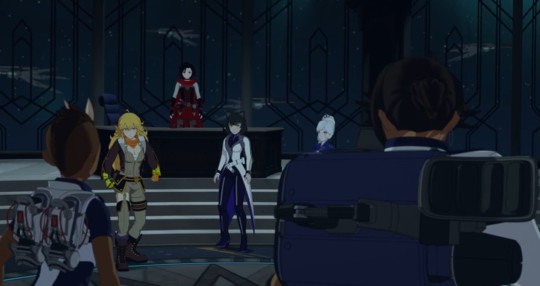
While Penny coldly walks away from Winter the fight between RWBY and the Ace Ops starts... and it’s just as absurd as I knew it was going to be. Please note throughout that, like Clover, the actual adults in the room are the only ones willing to compromise. Harriet makes it clear that she will not start this fight. She emphasizes that an arrest is only “Until this is sorted out...” As established, the only reason why they’re being arrested at all is because RWBY made it clear that they would actively stand in the way of Ironwood doing his job. They betrayed him first---as Elm will later point out---and they all but announced that they will continue to betray him so long as they’re free. You created this situation. Here, that agency is repeated. “We’re not doing anything. They decide what happens next.” You can still walk away from this and accept that you’ve made a mistake. It’s another Cordovin situation. Ruby has the choice to attack an ally or act mature for once and not make things worse... she decides to make things worse.
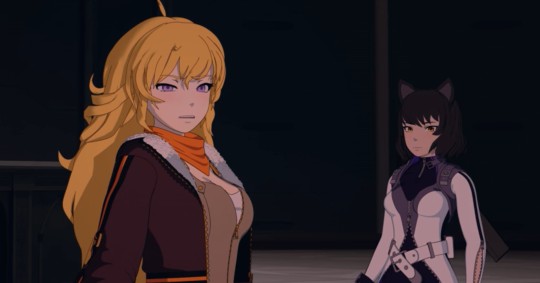
(Also I despise Yang’s little, “Really?” when Harriet closes down the room like... please lose the attitude. Just for five seconds. I’m begging you.)
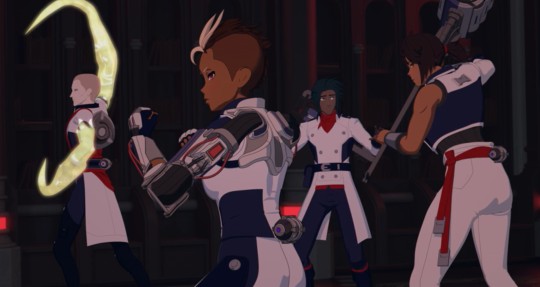
Marrow is hesitant as most assumed he would be but he nevertheless stands by his team. Especially once Harriet makes it clear that they’re not going to unduly attack these teenagers. They will only defend themselves. It’s Ruby blasting through the doors that kicks things off, but not before she sets up the “justification” for how these drop-out second years beat the best huntsmen in all of Atlas.
“You were... then you trained us.”
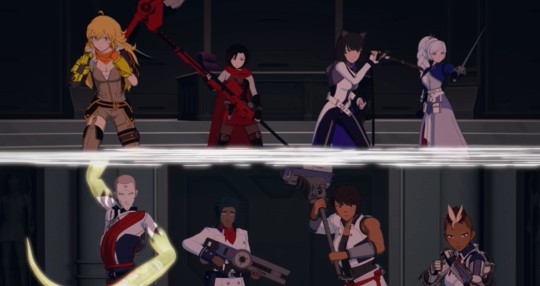
Really? That’s the explanation? A few training sessions beats full schooling and years more experience/practice? I knew the show was going to give us some BS reason for why the group was able to beat what’s quite possibly the most elite team in the entire world at this point, but this is still straight-up absurd. At this point I suppose Team RWBY really doesn’t need anyone else. Adults have never once helped them---we did it all ourselves!---everyone else is always wrong, and they’re the most powerful now, so obviously they don’t even have anything else to learn technique-wise. Good. Great. Thanks, I hate it.
Also, let’s just talk about manipulation for a second. Later on Qrow will accuse Clover of this, claiming he’s manipulating him by saying that he should surrender since Robyn needs help... even though that’s just a straight up fact. Robyn is injured. She does need help, and she won’t get it so long as Qrow insists on picking a fight with someone who does not want to fight him. Even if everyone agrees that Clover is 100% in the wrong for trying to arrest Qrow in the first place, someone’s life potentially being on the line kind of supersedes that. Idk about you all but if someone getting medical help rested on me turning myself in... I’d turn myself in. Clearly Qrow doesn’t give a damn about Robyn if he’s willing to place his freedom over her safety and Clover is right to point that out. What is manipulation though? Ruby’s talk with Harriet. Notice the staggering difference in tone. She’s pure cocky confidence when she announces that the Ace Ops are no longer the best huntsmen in Atlas and then the second Harriet manages to slam Ruby into the wall her entire presentation changes. “You know we need to be working together!” she cries. Her voice is childish again, the arrogance is gone, she’s putting the responsibility on Harriet to “work together” even though Ruby, all of three seconds ago, is the only who rejected Harriet’s offer that they didn’t need to fight. And this only happens when Ruby is in a position where it looks like she’s losing. Oh no, Harriet actually managed to catch me and slam me into the elevator hard enough to dent it? Clearly she won’t be as easy to beat as I thought, so let’s act like a vulnerable kid again begging you to do the “right” thing, instead of a confident huntress starting this fight in the first place... that’s manipulation. Ruby is deliberately changing how she portrays both herself and the situation depending on whether or not she’s getting what she wants, aka winning.
Harriet responds to that precisely as she should: “Don’t give me that crap.”
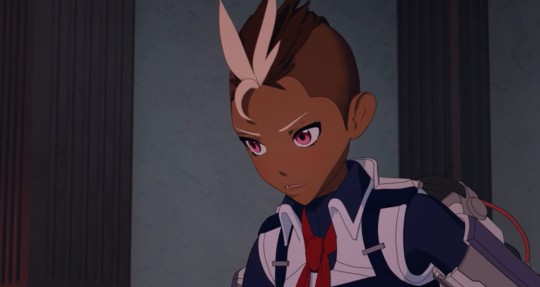
Really, the whole fight is an exercise in frustration as Team RWBY endlessly refuses to admit that they could ever do anything wrong. Elm shouts that they betrayed them first and all Blake cares about is how they’re betraying the people now. Just swipe our sins under the rug because clearly they don’t matter, to say nothing of the fact that those sins led to this conflict in the first place. Yang snidely announces that, “It’s not worth it, Blake. They’re just following orders” even though that is straight up not the case. You’ve been lying since Volume 5, Yang, so forgive me if I’m not about to take you at your word. Especially when I just watched a full ten minutes last week straight up proving you wrong.
Honestly does Rooster Teeth think we’re not watching the show? That they can just make new claims each week and have us not remember the blatant contrasts that came before it, stuff that they provided? It’s like this every episode now. Whatever we see happening on screen is quickly erased and replaced with whatever Team RWBY believes and I’m so completely over it.
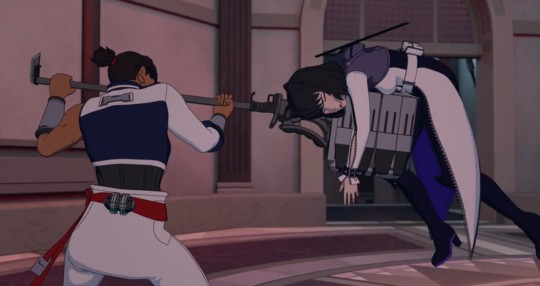
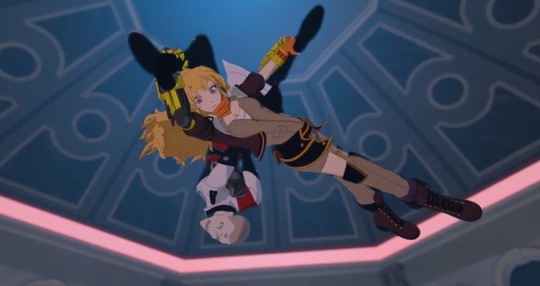
The whole fight is just stupidity incarnate. Not the animation---beautiful there---but everything else is a chore to watch. I enjoy how we get not one, but TWO moments where the Ace Ops announce that they’re not going to hold back anymore... only to then have the group immediately beat them after that announcement. Marrow’s true power is hinted at with, “I’m trying to arrest her, not kill her” only for Weiss to take him out with one shot when he finally uses his semblance. Vine and Elm talk about how they’re going to take this fight seriously now, only for Yang to beat them both easy-peasy immediately afterward. It doesn’t get much more contrived than that. None of the group even needed to help one another, with the exception of Blake and Yang who are, of course, never ever separated (not even in a clear 4v4 battle). I could maybe buy one of the group getting lucky and then two or three teaming up to take out another Ace Op. If Ruby took advantage of Harriet’s exhaustion after the battle and then went to help Weiss take out Marrow together. But no. No one needs any assistance. I mean yeah, Weiss throws up an ice barrier, but it’s clear Ruby didn’t need the help. Especially after getting the cuffs around Harriet. Weiss just hurried things along.
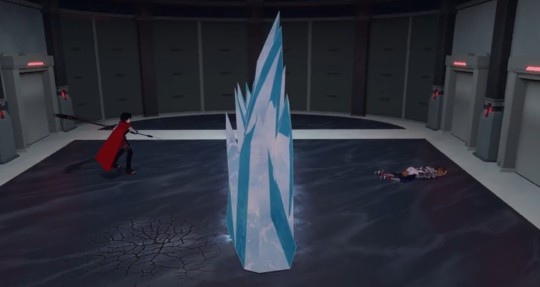
Afterwards the group isn’t even winded and all their auras are intact. It’s insane. And you know what I kept thinking the whole time? Ironwood gave you all those armor and weapon upgrades. Yang relies heavily on Atlas bombs in this fight. Based on Ruby’s comment, their ability to go head-to-head with the Ace Ops at all lies in what they taught them. We’re talking about betrayals? It really hits home that the group’s victory is built on all the trust they were shown by others. The training and the weapons and the resources and the safety and the support and the time to improve their skills. Then Team RWBY turned around and attacked them with it.
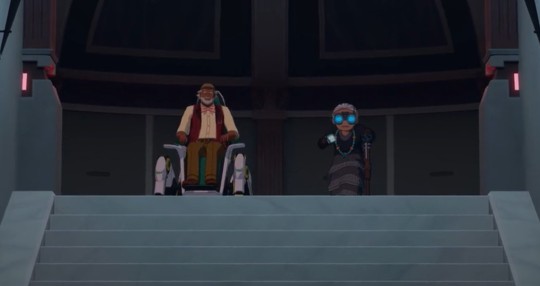
We end that battle with Maria and Pietro showing up. Maria, oh so shockingly, turns it all into a joke. “This is the part where they ask us to help.” Team RWBY? Facing criticism, or even just suspicion when caught with a bunch of unconscious military personnel? Nah. Just give ‘em a hand!
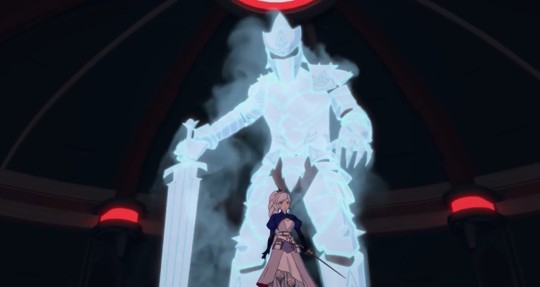
The only part I liked in this fight was Weiss’ comment about Mantle being her home. That’s a motivation I could get behind, not just a general, “We can’t abandon the people!” but an emotional attachment to her kingdom that blinds her to the hard realities of the situation. It’s too bad that wasn’t explored further.
We then move onto JNR and honestly? I found this scene to be a bit underwhelming. Granted, I liked the setup between Nora, Neo, and Oscar. Seeing “Oscar” standing in the hallway and smiling in a way that we knew immediately was Neo made for a wonderfully creepy and briefly tense moment. Kudos there.
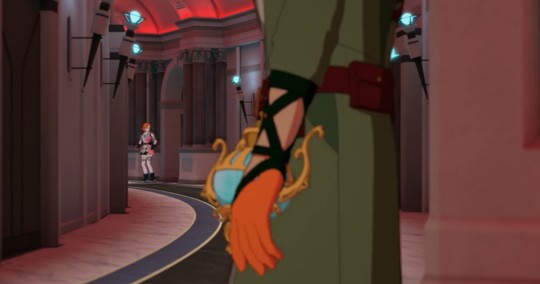
What I like less is:
1. Not getting to see that initial fight between Oscar and Neo. All his characterization keeps happening off screen.
2. Still no Ozpin. By denying us that first encounter we likewise lost the presumed resolution of Ozpin providing aid, either by speaking to Oscar or taking over the fight.
3. Connected to 2... since when the hell can Oscar survive Neo for an undetermined length of time? I mean seriously. Which is it, Rooster Teeth? Is Oscar still so weak that it’s oh-so-obvious why he wouldn’t help a team of thirteen others fight a geist, or is he so strong he can 1v1 Neo until JNR shows up? Because the discrepancy between those is massive. There’s not even an implication that Oscar just successfully hid from her or something. When he appears he straight up lands a punch on her, despite telegraphing it in the most obvious way possible.
It’s just so, so messy. There’s no consistency at all anymore. Neo can take on a Maiden but gets blindsided by a barely-trained kid all but screaming, “I’m going to punch you now!”? Alright. Sure. I don’t know why I’m even surprised at this point.
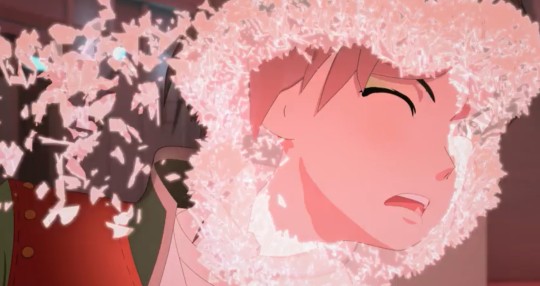
So it’s Team JNOR vs. Neo next episode. Obviously if Oscar can handle her himself then the four of them should take her out in an instant.
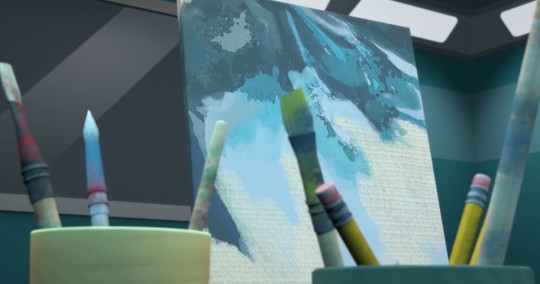
We return to Penny and Winter where she says, “I hope it’s painless for her,” referring to losing the Maiden during the transfer. Obviously this post is more salt than meta so here, have some more: Penny is an absolute brat here. “You said your personal feelings don’t matter.” I don’t care if she’s a robot, Penny knows enough to understand the situation and realize that a comment like that is just straight up cruel. If she fundamentally disagreed with what Winter said in the hallway then she would have left like Team RWBY. Instead she’s here, acknowledging that even if she doesn’t like this, they’re both making the right call in helping Winter gain the Maiden powers and then retreating from Salem. So don’t twist the knife by implying that Winter is so heartless she doesn’t even care about the Maiden’s comfort. You don’t get to assist in this and drag Winter for the same exact thing.
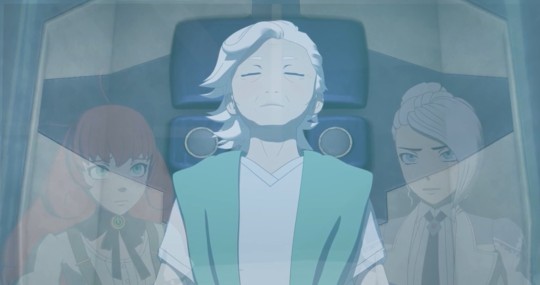
Winter is astoundingly patient with her attitude, precisely how Ironwood was patient with the group criticizing and yelling at him all volume. She explains that of course she still feels badly. You can wrestle with your feelings while still taking action, something Team RWBY (and most of the fandom) clearly doesn’t get. Penny at least admits that she thinks she understands now, which is more growth in a sentence then we’ve gotten from Team RWBY in two volumes. We also see that Winter does intend to use the machine to transfer the power, something we’re not even sure works yet considering that Pyrrha never got to complete the process (the Volume 3 parallels aren’t at all subtle).
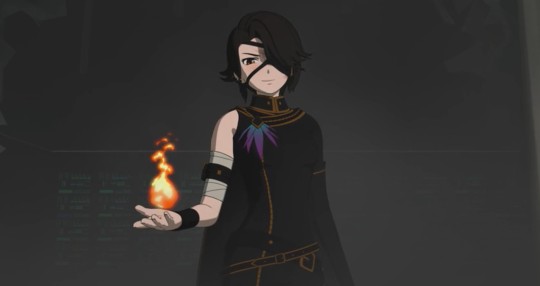
Which is when Cinder shows up. She obviously kills all the guards and blasts through the doors, demonstrating just a small sampling of her power. Penny recognizes her as the one who orchestrated her death and announces that she has “feelings” about it. So it’s a Penny and Winter vs. Cinder fight as well next week. For the record, this is a moment when you don’t back down from a fight. When standing your ground through violence is heroic rather than immature and dangerous. What I’m getting at is: Penny and Winter are best girls at the moment. Level-headed, heroic, compassionate, and when they’re not they learn from that. They grow. Thank god at least some characters are still marginally intact.
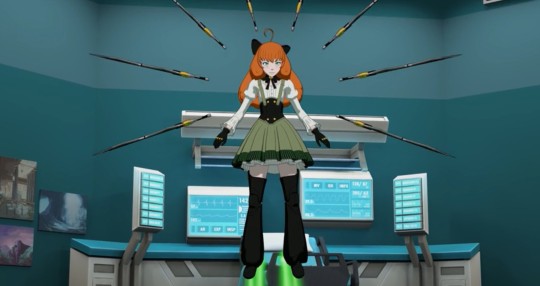
All of which finally brings us back to Qrow and the others. 4,000 words in and my fingers are tired, but I’ll attempt to give this fight the attention it deserves lol.
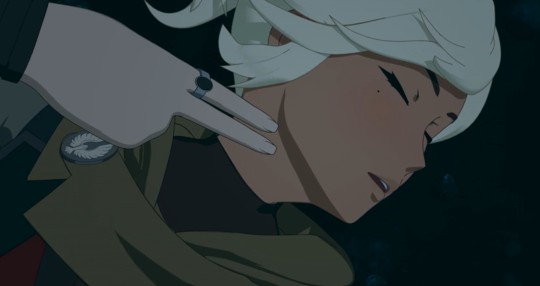
The airship has crashed almost directly below Amity Arena---that’s some kind of setup. Could Watts still be inside?---and, as mentioned, Robyn is rendered unconscious during the crash and clearly needs help. Qrow goes so far as to check her pulse. We get that “manipulation” on Clover’s part which is really just him laying out precisely what the situation is: you can either fight me when neither of us want that, endangering Robyn in the process, or you can accept being arrested, get her help, and we’ll see if we can work things out back in Atlas. “We don’t have to fight, friend,” he says and Qrow scoffs at that. Because remember, he’s Yang’s uncle too. This family never backs down from a fight, even a needless one, and you’re only their “friend” if you do precisely what they want at all times. Otherwise you’re an enemy. Even when there are clearly real enemies standing right beside you.
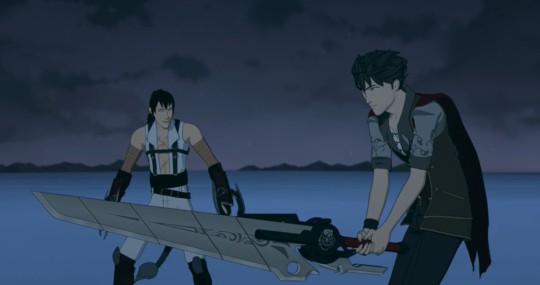
Now, I’m already seeing absolutely illogical posts claiming that Tyrian manipulated Qrow and... no. Just no. That’s not at all what happened. First off, it’s clear before Tyrian even gets involved again that Qrow is hell-bent on making bad decisions all on his own. As said, he’s prioritizing fighting Clover over getting Robyn help, or dealing with Salem, or literally anything else that’s a bigger issue right now. Qrow isn’t thinking. I mean, what does he even intend to do if he somehow manages to beat both Clover and Tyrian on his own (when he couldn’t even beat Tyrian solo in Volume 4)? Is he going to take Robyn back to Atlas himself? The city where he’s still a wanted man? The city Clover already wants to take him to, even if it’s in handcuffs? What’s he going to do with the serial killer exceptionally skilled at breaking out of his bonds? What’s he going to do with an exhausted or unconscious Clover? Leave him out there in the cold? The cold that both Weiss and our recent heating crisis insists can kill you very quickly without aura? Here is another, beautiful example of our “heroes” emphasizing fighting as the go-to answer without considering the repercussions of that. Qrow doesn’t need Tryian to manipulate him into bad decisions. He’s doing a great job of it all on his own.
When Tryian does arrive though---and for the record him dislocating his thumb was great. I have dislocated my thumb before, folks, and it’s a ride---Qrow WILLINGLY teams up with him. Just like Robyn going, “He’s right” there is precisely zero ambiguity here.
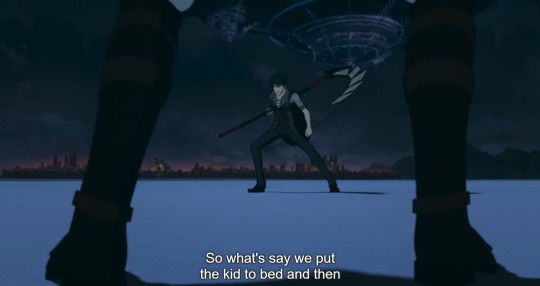
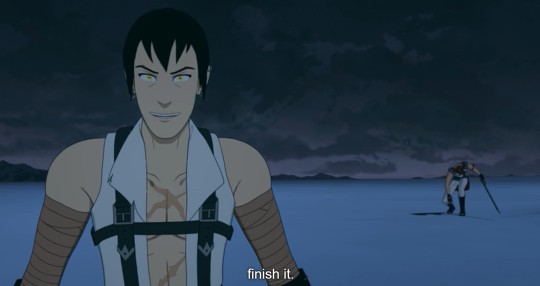
Tyrian offers to work with Qrow to take out Clover and Qrow agrees. Full stop. That’s what happened. He had all the information, all his own agency, and he made that decision all on his own. He literally teams up with the villain to take out an ally. “No wait,” I see posts saying, “Qrow never wanted to kill Clover! He just wanted to get him to stop fighting. It’s not his fault it ended like that...” Excuse me, but what do you think serial killers do? He NEVER could have IMAGINED that TYRIAN might BETRAY him people say, as if that’s not the entire basis of Tyrian’s character. He kills people and laughs about it. It’s his thing and thus there is no justification for trusting him, only stupidity. Which doesn’t even include Qrow just gunning for Clover in the first place. He needs Clover to beat someone like Tyrian---we proved that through a comparison of Volume 4 with last week’s battle---but yeah, sure, team up with Salem’s henchmen to take out your friend, banking on the fact that Tyrian won’t do a single naughty thing along the way and that you will somehow be able to take him out solo after it’s all done. This? This is on Qrow.
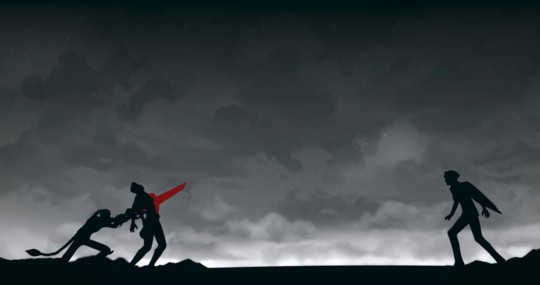
I mean it’s mostly on Tyrian for doing the actual killing, I hope people get that, but it’s also on Qrow. When Tyrian says, “You mean like how you just killed Clover?” he’s not just talking about a framing, Qrow left alone with airships landing and his own weapon covered in blood. He set up the scenario that led directly to Clover’s death. He attacked and willfully endangered an ally. He is culpable.
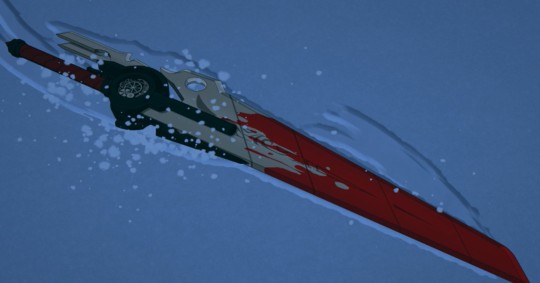
The fact that Qrow is screaming beforehand, “Why couldn’t you just do the right thing instead of the thing you were told?!” while Clover announces that, “I trust James with my life and I wanted to trust you” just makes it all the more worse. RWBYJNROQ has no trust for anyone outside of their own team. Ironwood and the Ace Ops all trusted them and had hopped that they could trust them in turn. Each and every time our “heroes” betrayed that trust horrifically. Qrow’s actions here are the ultimate demonstration of that. Rather than trusting Clover to take him in and working through this situation together, Qrow decides that he trusts Tyrian more. Literally that’s what it came down to. I trust Tyrian to have my back more than I trust you to help me through an arrest we don’t understand yet... and wow. That’s just one hell of a stance to take.
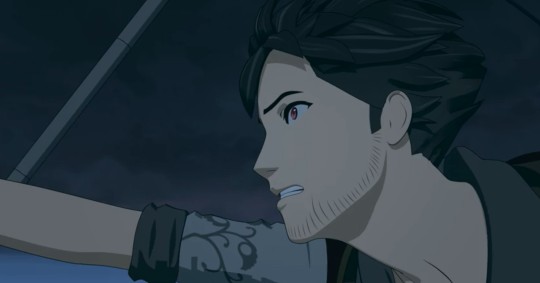
And Qrow then has the gall to blame Ironwood for this. Which just sets my blood on fire. Like full on, “Remember this is a fictional show, Clyde, and tone done the emotional investment” anger. Because it’s not just that Qrow is straight-up delusional here. I mean, I’m sorry, but did Ironwood force Robyn to take a shot at Clover? Was Ironwood out in this wasteland forcing you to put your trust in Tyrian over an ally you’ve spent weeks befriending? No, Qrow doesn’t get to let himself off the hook here. This is precisely the same absurd “logic” the fandom uses on Ozpin in regards to Pyrrha. He never got her killed. Pyrrha chose to go fight Cinder herself, expressly against Ozpin’s wishes. Here, Ironwood did not get Clover killed. Qrow decided to fight him and team up with Tyrian, expressly against Ironwood’s wishes of merely sidelining them until he can get Atlas to safety. So Qrow is lying to himself. Completely. Which could be a really compelling situation wherein Qrow must come to grips with his own guilt and learn not to blame Ironwood for his own choices, except...
The narrative supports it.
Again.
Because Qrow says, “James will take the fall” and Clover smiles a happy, serene smile up at him. Gone is the loyalty to Ironwood---something we saw just seconds ago---and in its place is the non-verbal agreement that Ironwood is at fault for this and yes, please make sure he pays for it.
I honestly stand amazed at how Rooster Teeth can take one of my favorite characters and so quickly screw him up, making me hate him in the process. Like I still love Qrow, but currently it’s in the same way I love the rest of the group: for who they were before Volume 6 and 7 slammed in to butcher everything good about them.
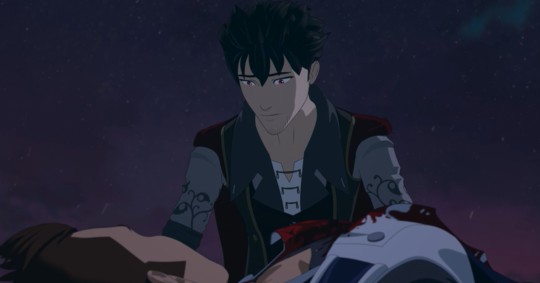
Finally, we need to end on a note that goes beyond just frustration at a web series and into some real life implications: the bury your gays trope. While Rooster Teeth is clearly trying in regards to their queer representation, as of this episode they’ve ultimately done more harm than good. Ilia, as I wrote back in Volume 5, was a terrible introduction to queer characters in a story built around heroic women, drawing not just from aspects of the psycho lesbian trope but “redeeming” her in a matter of minutes to try and distance her sexuality from her status as a villain. Saphron and Terra, while absolutely lovely, are still just minor characters that the story has now entirely forgotten (which, notably, same with Ilia). Blake and Yang are the primary queer ship in the works... but they’re not canon yet. Oh, I believe wholeheartedly that Rooster Teeth is setting things up and that they’re not at all subtle about it---I’m not here to argue that they’re “just friends”---but until we’re given actual, on screen acknowledgment of their sexuality and/or relationship it remains in the realm of interpretation, no matter how “obvious” it may seem to some. Hinting at queerness is no longer an appropriate stand-in for clear representation. Meanwhile, in regards to the men, Rooster Teeth has taken their most queer coded character, Ozpin, and not only crafted his character around the fact that he is endlessly doomed to die, but then wrote him out of the story for nearly two whole volumes, potentially longer depending on how our finale goes. That’s a different kind of “death” in storytelling. Even if we can’t literally kill you off, we can orchestrate a situation wherein we just don’t have to deal with you.
Now, there’s Qrow and Clover. I’ve spoken elsewhere about how in their case I do think there’s a solid argument for “just friends,” but there’s an equal argument for more and the mere existence of that puts a really horrible taste in my mouth when I watch Clover get gutted on screen. Qrow has relationships with other men in the series and they’re not nearly as soft as what he had with Clover. Again, their setup isn’t in the realm of Blake/Yang with obvious hand-holding and massive blushes, but there’s a definite encouragement to at least think about reading them as flirting. Besides Ozpin---which we’ve discussed---Clover is the only one Qrow has quite, philosophical talks with. He’s the only one besides the kids who he teases and gets teased in turn. The final image of them, this one,
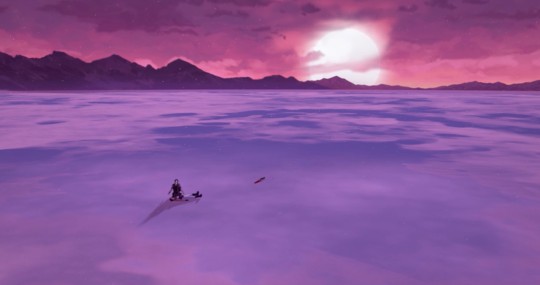
pulls from a number of romantic tropes. The partner kneeling by the body of their lover. The romantic colors in the setting sun. Qrow’s skyward scream and his vow of revenge, drawing parallels between other RWBY relationships like Jaune and Pyrrha. Rooster Teeth may not have queer baited with the same callous intensity as some shows, but they welcomed that perspective nonetheless and then killed Clover in a bloody, horrific fashion. That doesn’t leave me feeling like I can trust them as writers, even ignoring everything else the last two years. Especially when they butchered Qrow’s characterization to achieve this. Bad enough you kill off a potential gay, but you do it through a needless fight and one of our most street-smart characters putting his trust in Tryian, of all people? Honestly, shame on them.
The only good thing that came out of all this? The part of the fandom that saw Clover’s death coming a mile away. You all deserve to shout out a massive, “Told you so!” this week because I’ve seen the absolutely visceral hate you’ve received for a well-supported---and now proven---theory. Can’t say I’m surprised the fandom did that to you, but I am sorry. So grab hold of that flimsy sliver lining. I’m just likewise sorry the theory came about in such a dissatisfying, upsetting way.
And that’s it. Next week is the finale. I’m looking forward to it, if only so we can be done with the canon for another year. Because y i k e s.
Until then 💜
138 notes
·
View notes
Text
Ravens and One-Eyed Cats, Oh My!
The unseen Ghost Host acts as a sort of ambassador, a go-between, someone equally able to speak to us in the mortal realm as well as to his fellow spirits (presumably). Other than a few directives from the Cast Member Butlers and Maids, telling us to get to the center of the stretching gallery, the GH is our only narrator and guide. He never really tells us what his motivation is in taking us on this little tour. Right up until the end of the ride, you don't know if he's good or evil.
We're so used to this arrangement by now that we forget that doing it this way was a choice. As it turns out, it was a choice made only a few months before the Haunted Mansion opened. Some of the rejected alternatives would have made for a very different ride experience if they had been implemented. One of these is fairly well known and has left traces behind in the ride. There is another one, far less well-known, which has left nothing behind. One thing they have in common is that both of them add an additional character who interacts with both the Ghost Host and with you, the rider.
Very different chemistry. This was not a trivial decision, as we'll see.
The Raven
Died in the wool Mansionites know a lot about this character, so if you're one of those, and you're impatient, you might scroll down to the Cat section, which includes stuff you've never seen, I promise.
Riders can hardly help noticing that there is a raven which accompanies them throughout the ride, starting with the Conservatory scene and ending at the entrance to the crypt at the end of the graveyard scene. There are five all together, but they are all supposed to be the same character. All it does is caw at us. Especially at DL, particular attention is drawn to it as we descend into the graveyard. Despite having our focus obviously directed at it at that point, we're gettin' bird noises and that's it.

Originally, the WDW raven sat on the branch right above you too, as you tilted back, but due to "guest abuse" it was moved back and put on a branch well off to the side. Ketchup packets, I imagine.
Caw-caw. At least the bird sounds real. According to Stacia Martin (The Sounds of Disneyland [Disney, 2005] 31), he was voiced by "Candy" Candido, best known as the go-to guy for basso profundo in cases where even Thurl Ravenscroft couldn't get low enough. (Candy must have had freakin' bridge cables for vocal cords.) What is less well-known is that Candy was extraordinarily versatile and could do very high voices as well. The same source says that Candy did the raven in Sleeping Beauty and simply hauled out his raven cry again ten years later for the Mansion.
Be that as it may, originally there were going to be several more ravens, including one in the stretching room and one in the foyer. (You can read about the latter one HERE). This was still going to be the case going into the spring of 1969. The raven was going to talk to you, along with the unseen Ghost Host. The 1968 show script which provided the basis for the "Story and Song from the Haunted Mansion" album preserves a lot of the raven's dialogue. The bird criticizes the stretchroom advice given by the GH ("He chose the coward's way! Caw-caw"). I guess the GH is a little miffed, because shortly afterwards he responds by warning you that the raven is a possessed creature, and its "restless spirit" may be looking for an opportunity to "better itself." This bickering leaves you wondering which (if either) of these voices from regions beyond should be trusted. But the raven is also the one who warns you about the ghostly hitchhikers at the end, so by that point you have probably come to trust the little guy. He even calls you "my friends," so you see? He cares. I guess there was no caws for concern. (Oh shut up; it's my blog.)
The eerie raven first appears in a Ken Anderson concept sketch. Marc Davis liked it and kept it, and it seems that there was never a time when it wasn't going to be part of the show.
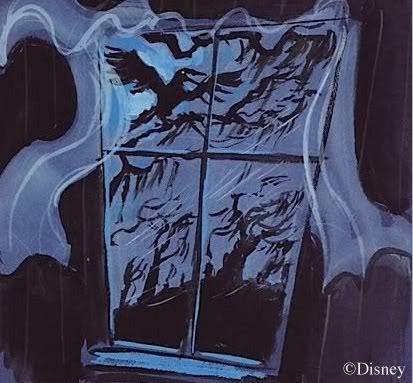
Is the talking raven taken from the famous Edgar Allan Poe poem? If we're speaking of an indirect influence, the answer is an easy yes. Poe is indeed responsible for adding the raven to the short list of recognized Halloween critters (bats, spiders, black cats, owls). But even in a direct sense, the answer is yes. In an early script, the raven warns us about itself (huh?) and the hitchhikers, with "nevermore's" and "evermore's" sprinkled everywhere. The lines were recorded at one point by the incomparable Eleanor Audley (Lady Tremaine, Maleficent, Madame Leota). Warning! If you're an admirer of Ms. Audley's work (yes, yes, I see those hands), this excerpt is painful to listen to. But we historians cannot afford the luxury of pity.
Beware of Eleanor's Raven, Forevermore
[Audio Link]
Oh geesh, that was bad. Anyway, it proves that X. Atencio was directly influenced by "The Raven" when he tried to script the character. One problem with the raven—besides being annoying—was that it was too small to command your attention in some of the larger scenes. Maybe a bigger animal would work. Let's see...no, you can't have an elephant in a haunted house. How about a black cat? More specifically, how about an Edgar Allan Poe-inspired black cat?
The One-Eyed Black Cat
"The Black Cat" is one of Poe's better known tales, often anthologized, and read in many a high school English class. If you've forgotten how it goes, here's a severely abbreviated summary:
The narrator had a beloved black cat for a pet, but one day in a fit of alcoholic rage he gouges out its eye with a knife. Later on, guilt at the sight of the one-eyed black cat turns to resentment and he kills the animal. Later he finds (or is found by) another one-eyed black cat and takes it as a pet. In yet another one of his fits of rage he murders his wife and walls her up in the cellar. When the police investigate, however, the narrator is betrayed by the howling of the cat inside the wall, where it had been walled up with the corpse.
A much creepier Poe animal than the raven, certainly. Most Mansion fans know about the existence of the one-eyed black cat only from a couple of Paul Frees outtakes, in which he tries out his note-perfect Bela Legosi and Peter Lorre voices while using a revised HM script. Dude, when Count Dracula sees fit to warn you about a kitty, it must be one bad motorscooter.
Ghost Host Bela warns you about a nasty cat
[Audio Link]
Ghost Host Peter warns you about it too
[Audio Link]
As you can gather from those, X's cat was much scarier and more demonic than his raven. None of the cat's dialogue has survived, but X did a series of concept sketches. The notion that the cat would be co-narrator may even predate the notion of putting the earlier raven character into that specific role. It looks as if the black cat might first manifest itself at first as nothing more than an eye:
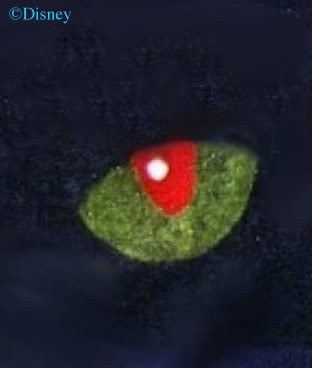
Apparently, the eye would morph into a shiny point of laser-like light, and a cat face would appear with only one eye. The first eye you saw turns out to be the missing one. From the looks of it, this loud and angry feline is looking for more than just a Little Friskies num-num.

The morphing continues, and the face rots into a more human form. Not surprisingly, this does nothing to improve its mood.
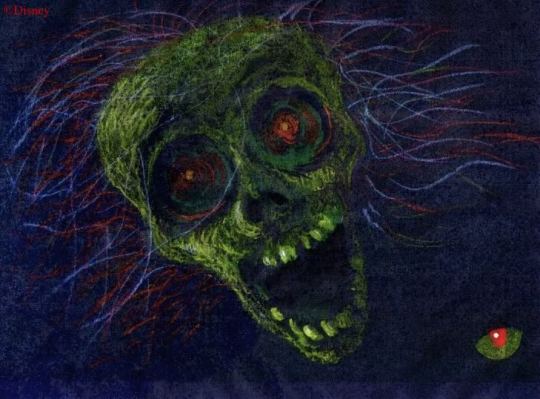
Good Lord. And how was this thing going to be presented? A projection? That isn't clear. It's possible that the "cat" was going to just pop out unexpectedly along the way in its various stages of demonic materialization. The face above looks a lot like a blast-up head in another X concept sketch. A quick look at some actual blast-up heads (inset) confirms that this is what the artwork is about.

So maybe our creepy "cat" was going to jump out and surprise us here and there throughout the ride. Good Lord.
When neither the demonic one-eyed black cat nor the "nevermore"-squawking raven ended up being used, the HM lost its only clear Edgar Allan Poe allusions (although you could make a case for a Tell-Tale Heart allusion in the bride's beating heart). It would have been nice if someone had told the composer of this WDW pre-opening publicity poster that the Haunted Mansion could no longer be accurately described as "Edgar Allan Poe-styled."

The black cat was a short-lived idea, with good reason. By having the Ghost Host warn you about a clearly malicious and dangerous creature like this one, he cast himself into the role of protector. He was there to help you. Similarly, in the 1968 script, the GH graciously informs you at the outset that you will not be harmed. That's very decent of him.
Too decent. Who wants Santa Claus for a Ghost Host? A haunted house is an allegory of life itself. You enter here and you exit there, and in between is a dark twisted corridor filled with frightening sights. You may get advice along the way, but you never have quite enough evidence to be sure that those voices have your best interest at heart. Do you really want to go into that haunted house that the neighbor kid put up in his garage for Halloween—the one who's a minor league juvenile delinquent the rest of the year?
Enter if you dare.
The Haunted Mansion is no different than any thirteen-year-old's spook house, and it's no different from life. Once you're in, you don't know if the Host is benign or malicious, so you have no choice but to go ahead, even with insufficient data. When you're stuck in a haunted house, the secret is to not panic and to keep your wits about you and to just keep going. If you do that, you're likely to make it.
Kinda like life.
So the trouble with the villainous black cat is that it made the Ghost Host much too unambiguously a good guy. It's important that he make you a little nervous, a little unsure.
What was the trouble with the raven, then, aside from being a tad too small? With the cat, we had a bad guy co-narrator and a good guy main narrator. With the talking raven, we had a morally ambiguous co-narrator along with a morally ambiguous Ghost Host. At first, you don't really know if either of them can be trusted. But in that case, why do you need two narrators? The real problem with the raven was that it was redundant. Turn off its dialogue and give its few substantive comments to the GH, and ta da, nothing is changed. Just make sure the GH never really tells you what he's up to.
.
Originally Posted: Wednesday, July 28, 2010
Original Link: [x]
7 notes
·
View notes
Link

I laughed. What else could I do?
No, Anders Carlson missing a potential game-icing field goal with 1:14 to play against Ole Miss isn’t something I’d have found funny at any other point in my Auburn football-watching life. But the Tigers had outgained the Rebels 502-to-232 at that point. They’d entered Ole Miss territory 10 times, while Ole Miss had entered Auburn territory only twice. Auburn had not given up a touchdown directly from either a special teams play or an offensive turnover; in fact, they’d only turned the ball over once. And for all of that, after Carlson’s miss, they were one Rebel drive from losing, one defensive breakdown from maybe the most disappointing loss of Gus Malzahn’s seven seasons as head coach.
So: on paper, a good-to-very good performance. On paper, a comfortable victory that offers optimism for more good home showings against the Amen Corner teams. On paper, an enjoyable viewing experience. In practice, teeth-gnashing frustration to the point of bitter laughter, because of course.
Because this is Malzahn’s Tigers tenure in one tidy 60-minute package. On paper, an Auburn program is plenty strong enough and plenty accomplished enough to keep any reasonable fan satisfied. In practice, even the reasonable fans can be excused if they’ve reached a point of frustrated exhaustion.
I hope they can be, anyway, since I reached that point in the wake of the game in Baton Rouge. As a fellow Cars-loving football-obsessed Southern Christian nerd, no Auburn coach of my lifetime has connected with me on a personal level more than Gus Malzahn. I’ve defended him on this site again and again and again, repeatedly during my SEC Country gig, on Twitter more times than I could possibly count. The determination of so, so many Auburn fans to irrationally dismiss his successes and cling to his failures has been a years-long disappointment.
But even my admiration and patience can do so much in the face of a drive chart like this:

13 possessions beginning in Auburn territory, 9 of them ending in a punt after 4 plays or fewer. 3 of them ending in LSU territory, none in a touchdown. 2 of them lasting longer than 5 plays, one of those ending in a punt from Auburn’s half of the field. All while an Auburn defense holds the same offense that shredded Alabama for 46 points in Bryant-Denny to 23 on its own field.
On paper, losing by 3 on the road at an all-but-certain playoff team is a-OK. In practice, I’m so tired of trying to talk myself into that paper that when Carlson’s missed field goal balls it up and throws it in the trash yet again, there’s nothing left to do but laugh.
—————————————————
In a piece now lost to SEC Country’s demise and the Internet ether, I argued before the 2017 Auburn-Georgia meeting that Malzahn was about to coach the biggest game of his Tigers career. 2013 was four years in the rearview, and despite some impressive performances in the interim, after blowing shoulda-coulda-woulda wins at UGA in 2016 and LSU in 2017, Gus needed to prove that he could still win a game that mattered — like, mattered-mattered — to Auburn fans. He whipped the Dawg crap out of Georgia, then destroyed Alabama for good measure. The evidence at the time seemed plain: give Gus both a competent quarterback and a competent defense, and his ceiling was still as high as it seemed in 2013.
The evidence 1.75 seasons later seems far murkier. Gus enjoyed both a competent quarterback and a far-more-than-competent defense last season, and it didn’t matter. Whether Bo Nix qualifies as competent or not might rest in the eye of the beholder, but surely we can agree he’s not Jeremy Johnson or 2015 Sean White, and at Florida and LSU that didn’t matter either.
So here we are, in November 2019, asking again if a Gus Malzahn team can win the games Auburn fans need him to win. It might not be fair to ask, given that his current Tigers have already beaten a potential Pac-12 champion-slash-playoff contender on a neutral field, are one of the 10 best teams in the country according to the best power ranking systems we have, and (Ole Miss flukishness aside) have continued to dispatch lesser SEC foes with aplomb. What more can you logically want? I ask myself.
The answer is that I want to feel giddy after an Auburn football victory again. I want to feel delighted. I want to wake up on Sunday morning still grinning about what happened the previous day. I want to sit back, exhale, and feel the buzzing in my bones I only get after Auburn has done something wondrous, something momentous. That hasn’t happened since 2017, and that Amen Corner remains the only time it’s happened since Tre Mason ran over Missouri.
That might be my problem. Perhaps the Oregon win — and Washington win before it — should have qualified. Perhaps beating LSU in 2014 or 2016 should have. Perhaps torching Bret “Bert” Bielema’s 2016 Arkansas or this year’s Mississippi State to flecks of campfire ash should have. But those teams aren’t good enough to provoke the emotional reaction I want. The LSU teams Gus defeated weren’t believed to be that great at the time, either. And as thrilling, reassuring, and resume-building as the victories over the Huskies and Ducks have been, there’s only so much weight a season-opener against a Pac-12 opponent can carry.
“Gus can’t beat good teams” is malarkey. “Gus’s record against Teams X, Y and Alabama is bad” is malarkey unless you’re also noting that his record against Alabama is better than anyone else’s in the SEC. Not acknowledging that Gus’s teams don’t lay season-wrecking Tuberville-style eggs*, don’t quit on him, don’t generate ugly off-field headlines, and do enjoy themselves enough that no less of a player than Derrick damn Brown would return for a senior season: definitely malarkey.
But it’s not malarkey to point out that Gus has gone a combined 4-9 against LSU and Georgia when many of those LSU and Georgia teams were Very Much Not All That Great and many of those games were Very Much Winnable. It’s not malarkey to say that going forward, those games likely won’t be any more winnable, either. It’s not malarkey to believe that if Gus can’t beat Georgia tomorrow or Alabama in a couple weeks, he’ll have put together one unambiguously good season in his last six.
After 2017, I’d have told you that yes, Gus remains the coach who gave us the CoxCat and the 2016 loss in Athens and a half-dozen other defeats whose pain and frustration go well beyond a notch on the bad side of the win-loss column. But I’d have also told you that as long as he could deploy a non-Jeremy Johnson quarterback, he’d repay that frustration with electrice, cathartic victory.
In 2019, the hair-pulling defeats are still here. As of yet, the soul-restoring victories are not. If Gus can’t rebalance that equation over the next month, it will only be fair to ask when/if he can.
——————————————
So roughly 24 hours from the Georgia game kicking off, it feels like we’re on a big outdoor train platform, Gus and myself. There’s long whistles in the distance, plumes of smoke. The trains are coming into the station.
This first one, its destination is one Amen Corner win or a couple of dignified, non-infuriating losses, followed by Gus’s unveiling as the new head coach at Arkansas. Who could blame him if he boards? His offensive line next season is one bad roll of the JUCO dice from disaster. No defense, not even this one, can lose the likes of Brown and Marlon Davidson without noticing. Nix can only improve so much. Rather than wait a year to get the boot, why not just go home while you can?
A second train huffs and puffs its way alongside the platform. I like it less. It will take Gus to a toothless repeat of the LSU game against the Dawgs, some unfortunate unfiltered comments from veteran defensive players afterward, and a decisive, demoralized defeat against Alabama. Auburn’s incensed boosters go through their couch cushions and pay the buyout.
The third train pulling into the station is my favorite. Passengers will have the pleasure of riding to a place much like 2017: a win over playoff hopeful Georgia, a win over playoff hopeful Alabama, a 10-2 record, a New Year’s Six bowl berth and good feelings all around. Those feelings will only last for so long — with next years roster and schedule, there’s a good chance this train brings us right back to this platform in two years’ time, just as 2017 didn’t keep us from it two years ago — but putting the final nail in both the Dawgs’ and Tide’s playoff coffins means no one cares (or should).
I don’t know which train Gus will board. I don’t know what happens after he does. If he does take a one-way trip away from Auburn, I don’t know if the Tigers will be able to replace him with anyone better. My hunch is that they cannot. But after the first 9 games of this season, I will not blame them if they try.
Here’s what I do know: something is about to happen. Auburn cannot wait on this platform forever, watching our rivals head off to exotic locales while it sips coffee and goes a homebody’s 8-4. Gus Malzahn has to choose his destination. I will carry his bags. I will give him a hug. I will wish him the absolute best, and mean every kind word.
But I also must ask him to decide where his program is going. I’m hoping it’s headed straight to victory over Georgia, and on to victory over Alabama. If not, we’ll deal with going other places, too. Like the last patron at the bar, like the late-night passenger who’s missed the final train, what matters is that Auburn can’t stay here.
*Well, the “get obliterated at home against Darren McFadden’s Arkansas or Andrew Zow’s Alabama” kind of egg-laying. Malzahn’s is more an exclusively “oops, our offense gained one first down in a half in a game we lost by less than a touchdown” kind of egg-laying.
Photo via @AUGoldMine
from The War Eagle Reader https://www.thewareaglereader.com/2019/11/gus-malzahn-and-the-whistles-of-the-trains/
0 notes
Text
We should have seen Trump coming | Ta-Nehisi Coates
The long read: Obamas rise felt like a new chapter in American history. But the original sin of white supremacy was not so easily erased
I have often wondered how I missed the coming tragedy. It is not so much that I should have predicted that Americans would elect Donald Trump. Its just that I shouldnt have put it past us. It was tough to keep track of the currents of politics and pageantry swirling at once. All my life I had seen myself, and my people, backed into a corner. Had I been wrong? Watching the crowds at county fairs cheer for Michelle Obama in 2008, or flipping through the enchanting photo spreads of the glamorous incoming administration, it was easy to believe that I had been.
And it was more than symbolic. Barack Obamas victory meant not just a black president but also that Democrats, the party supported by most black people, enjoyed majorities in Congress. Prominent intellectuals were predicting that modern conservatism a movement steeped in white resentment was at its end and that a demographic wave of Asians, Latinos and blacks would sink the Republican party.
Back in the summer of 2008, as Obama closed out the primary and closed in on history, vendors in Harlem hawked T-shirts emblazoned with his face and posters placing him in the black Valhalla where Martin, Malcolm and Harriet were throned. It is hard to remember the excitement of that time, because I now know that the sense we had that summer, the sense that we were approaching an end-of-history moment, proved to be wrong.
It is not so much that I logically reasoned out that Obamas election would author a post-racist age. But it now seemed possible that white supremacy, the scourge of American history, might well be banished in my lifetime. In those days I imagined racism as a tumour that could be isolated and removed from the body of America, not as a pervasive system both native and essential to that body. From that perspective, it seemed possible that the success of one man really could alter history, or even end it.
I had never seen a black man like Barack Obama. He talked to white people in a new language as though he actually trusted them and believed in them. It was not my language. It was not even a language I was much interested in, save to understand how he had come to speak it and its effect on those who heard it. More interesting to me was that he had somehow balanced that language with the language of the south side of Chicago. He referred to himself, unambiguously, as a black man. He had married a black woman. It is easy to forget how shocking this was, given the common belief at the time that there was a direct relationship between success and assimilation. The narrative held that successful black men took white wives and crossed over into that arid no-mans-land that was not black, though it could never be white. Blackness for such men was not a thing to root yourself in but something to evade and escape. Barack Obama found a third way a means of communicating his affection for white America without fawning over it. White people were enchanted by him and those who worked in newsrooms seemed most enchanted of all.
But I could see that those charged with analysing the import of Obamas blackness were, in the main, working off an old script. Obama was dubbed the new Tiger Woods of American politics, as a man who wasnt exactly black. I understood the point Obama was not black as these writers understood black. It wasnt just that he wasnt a drug dealer, like most black men on the news, but that he did not hail from an inner city, he was not raised on chitterlings, his mother had not washed white peoples floors. But this confusion was a reduction of racisms true breadth, premised on the need to fix black people in one corner of the universe so that white people may be secure in all the rest of it. So to understand Obama, analysts needed to give him a superpower that explained how this self-described black man escaped his assigned corner. That power was his mixed ancestry.
The precise ancestry of a black drug dealer or cop killer is irrelevant. His blackness predicts and explains his crime. He reinforces the racist presumption. It is only when that presumption is questioned that a fine analysis of ancestry is invoked. Frederick Douglass was an ordinary nigger while working the fields. But when he was a famed abolitionist, it was often said that his genius must derive from his white half. Ancestry isnt even really necessary. My wife, Kenyatta, was the only black girl in her Tennessee gifted and talented classes from age six. She could dance and double dutch with the best of them. Her white classmates did not care. Youre not really black, they would say. They meant it as a compliment. But what they really meant was to slander her neighbours and family, to reorder the world in such a way that confirmed their status among the master class. And if Obama, rooted in the world of slaves, could rise above the masters, all the while claiming the identity and traditions of slaves, was there any real meaning in being a master at all?
Denying Barack Obama his blackness served another purpose: it was a means of coping with having been wrong. Those of us who did not believe there could be a black president were challenged by the sudden prospect of one. It is easy to see how it all makes sense now in every era there have been individual black people capable of defying the bonds of white supremacy, even as that same system held the great mass of us captive. I will speak for myself and say that before Obamas campaign began, the American presidency seemed out of reach. It existed so high in the firmament, and seemed so synonymous with the countrys sense of itself, that I never gave the prospect of a black president much thought.
By the summer of 2008, it was clear that Id made an error. Two responses were possible: (1) assess that error and reconsider the nature of the world in which I lived; or (2) refuse to accept the error and simply retrofit yesterdays reasoning to this new reality. The notion that Obama was a different kind of black allowed for that latter option and the comfort of being right. But some of us had not wanted to be right. And when we asserted that America aint never letting no nigger be president, we were not bragging. Instinct warned me against hope. But instinct had also warned me against Obama winning Iowa, and instinct was wrong. And if we had misjudged Americas support for a black man running to occupy the White House, perhaps I had misjudged the nature of my country. Perhaps we were just now awakening from some awful nightmare, and if Barack Obama was not the catalyst of that awakening, he was at least the sign. And just like that, I was swept away, because I wanted desperately to be swept away, and taking the measure of my community, I saw that I was not alone.
There is a notion out there that black people enjoy the sisyphean struggle against racism. In fact, most of us live for the day when we can struggle against anything else. But having been, by that very racism, pinned into ghettos, both metaphorical and real, our options for struggle are chosen long before we are born. And so we struggle out of fear for our children. We struggle out of fear for ourselves. We struggle to avoid our feelings, because to actually consider all that was taken, to understand that it was taken systemically, that the taking is essential to America and echoes down through the ages, could make you crazy. But after Obamas election it seemed that perhaps there was another way. Perhaps we, as Americans, could elide the terrible history, elide the national crime. Maybe it was possible to fix the problems afflicting black people without focusing on race. Perhaps it was possible to think of black people as a community in disproportionate need, worthy of aid simply because they were Americans in need. Better schools could be built, better healthcare administered, better jobs made available, not because of anything specific in the black experience but precisely because there isnt. If you squinted for a moment, if you actually tried to believe, it made so much sense. All that was needed for this new theory was a champion articulate, young, clean. And maybe this new champion had arrived.
That was one way of thinking about things.Here was another. Son, my father said of Obama, you know the country got to be messed up for them folks to give him the job. The economy was on the brink. The blood of untold numbers of Iraqis was on our hands. Hurricane Katrina had shamed the society. From this other angle, post-racialism and good feeling were taken up not so much out of elevation in consciousness but out of desperation.
It all makes so much sense now. The pageantry, the math, the magazines, the essays heralded an end to the old country with all its divisions. We forgot that there were those who loved that old country as it was, who did not lament the divisions but drew power from them.
A Confederate flag with the name of US president Donald Trump, North Carolina, May 2017. Photograph: Shannon Stapleton/Reuters
And so we saw postcards with watermelons on the White House lawn. We saw simian caricatures of the first family, the invocation of a food-stamp president and his anticolonial, Islamist agenda. These were the fetishes that gathered the tribe of white supremacy, that rallied them to the age-old banner and if there was one mistake, one reason why I did not see the coming tragedy, why I did not account for its possibilities, it was because, at that point, I had not yet truly considered that banners fearsome power.
The opportunity for that consideration came by coincidence. The eight years of Barack Obama bracketed the 150th anniversary of the civil war Americas preeminent existential crisis. In 1861, believing themselves immersed in a short war, the forces of union thought white supremacy was still affordable. So even in the north the cause of abolition was denounced, and blacks were forbidden from fighting in the army. But the war dragged on, and wallowing in white supremacy amid the increase of dead was like wallowing in pearls amid a famine. Emancipation was embraced. Blacks were recruited and sent into battle. Later they were enfranchised and sent to serve in the halls of government, national and statewide. But in 1876, with the hot war now passed, and the need for black soldiers gone, the country returned to its supremacist roots. A revolution has taken place by force of arms and a race are disenfranchised, wrote Mississippis Reconstruction-era governor, Adelbert Ames.
They are to be returned to a condition of serfdom an era of second slavery The nation should have acted but it was tired of the annual autumnal outbreaks in the South The political death of the negro will forever release the nation from the weariness from such political outbreaks. You may think I exaggerate. Time will show you how accurate my statements are.
So there was nothing new in the suddenly transracial spirit that saw the country, in 2008, reaching for the best part of itself. It had done so before and then promptly retrenched in the worst part of itself. To see this connection, to see Obamas election as part of a familiar cycle, you would have had to understand how central the brand of white supremacy was to the country. I did not. I could remember, as a child, the black nationalists claiming the country was built by slaves. But this claim was rarely evidenced and mostly struck me as an applause line or rhetorical point. I understood slavery as bad and I had a vague sense that it had once been integral to the country and that the dispute over it had, somehow, contributed to the civil war.
But even that partial sense ran contrary to the way the civil war was presented in the popular culture, as a violent misunderstanding, an honourable duel between wayward brothers, instead of what it was a spectacular chapter in a long war that was declared when the first Africans were brought chained to American shores.
When it comes to the civil war, all of our popular understanding, our popular history and culture, our great films, the subtext of our arguments are in defiance of its painful truths. It is not a mistake that Gone With the Wind is one of the most read works of American literature or that The Birth of a Nation is the most revered touchstone of all American film. Both emerge from a need for palliatives and painkillers, an escape from the truth of those five short years in which 750,000 American soldiers were killed, more than all American soldiers killed in all other American wars combined, in a war declared for the cause of expanding African slavery. That war was inaugurated not reluctantly, but lustily, by men who believed property in humans to be the cornerstone of civilisation, to be an edict of God, and so delivered their own children to his maw. And when that war was done, the now-defeated God lived on, honoured through the human sacrifice of lynching and racist pogroms. The history breaks the myth. And so the history is ignored, and fictions are weaved into our art and politics that dress villainy in martyrdom and transform banditry into chivalry, and so strong are these fictions that their emblem, the stars and bars, darkens front porches and state capitol buildings across the land to this day.
The implications of the true story are existential and corrosive to our larger national myth. To understand that the most costly war in this countrys history was launched in direct opposition to everything the country claims to be, to understand that it was the product of centuries of enslavement, which is to see an even longer, more total war, is to alter the accepted conception of America as a beacon of freedom. How does one face this truth or forge a national identity out of it?
For now the country holds to the common theory that emancipation and civil rights were redemptive, a fraught and still-incomplete resolution of the accidental hypocrisy of a nation founded by slaveholders extolling a gospel of freedom. This common theory dominates much of American discourse, from left to right. Conveniently, it holds the possibility of ultimate resolution, for if right-thinking individuals can dedicate themselves to finishing the work of ensuring freedom for all, then perhaps the ghosts of history can be escaped. It was the common theory through its promise of a progressive American history, where the country improves itself inexorably and necessarily that allowed for Obamas rise. And it was that rise that offered me that chance to see that theory for the illusion that it was.
Immersed in my reading, it became clear to me that the common theory of providential progress, of the inevitable reconciliation between the sin of slavery and the democratic ideal, was myth. Marking the moment of awakening is like marking the moment one fell in love. If forced I would say I took my tumble with the dark vision of historian Edmund Morgans book American Slavery, American Freedom. Certainly slavery was contrary to Americas stated democratic precepts, conceded Morgan, but in fact, it was slavery that allowed American democracy to exist in the first place. It was slavery that gifted much of the south with a working class that lived outside of all protections and could be driven, beaten and traded into generational perpetuity. Profits pulled from these workers, repression of the normal angst of labour, and the ability to employ this labour on abundant land stolen from Native Americans formed a foundation for democratic equality among a people who came to see skin colour and hair textures as defining features. Morgan showed the process in motion through the law rights gradually awarded to the mass of European poor and oppressed, at precisely the same time they were being stripped from enslaved Africans and their descendants.
It was not just Edmund Morgan. It was James McPherson. It was Barbara Fields. It was David Blight. Together they guided me through the history of slavery and its cataclysmic resolution. I became obsessed and insufferable. Civil war podcasts were always booming through the house. Id drag Kenyatta and our son, Samori,to the sites of battles Gettysburg, Petersburg, the Wilderness audiobooks playing the whole way. I went to Tennessee. I saw Shiloh. I saw Fort Donelson. I saw Island No 10. At every stop I was moved. The stories of suffering, limbs amputated, men burned alive, the bravery and gallantry, all of it seeped up out of the ground and enveloped me. But something else accompanied this hallowed feeling: a sense that the story, as it was told on these sites, as it was interpreted by visitors most of them white was incomplete, and this incompletion was not thoughtless but essential. The tactics of the war were always up for discussion, but the animating cause of those tactics, with but a few exceptions, went unsaid.
Former slaves working as labourers for the Union war effort at White House Landing, Virginia, 1863. Photograph: Andrew J Russell/Medford Historical Society Col
By then, I knew. The history books spoke where tourism could not. The four million enslaved bodies, at the start of the civil war, represented an inconceivable financial interest $75bn in todays dollars and the cotton that passed through their hands represented 60% of the countrys exports. In 1860, the largest concentration of multimillionaires in the country could be found in the Mississippi River valley, where the estates of large planters loomed.
Any fair consideration of the depth and width of enslavement tempts insanity. First conjure the crime the generational destruction of human bodies and all of its related offences domestic terrorism, poll taxes, mass incarceration. But then try to imagine being an individual born among the remnants of that crime, among the wronged, among the plundered, and feeling the gravity of that crime all around and seeing it in the sideways glances of the perpetrators of that crime and overhearing it in their whispers and watching these people, at best, denying their power to address the crime and, at worst, denying that any crime had occurred at all, even as their entire lives revolve around the fact of a robbery so large that it is written in our very names. This is not a thought experiment. America is literally unimaginable without plundered labour shackled to plundered land, without the organising principle of whiteness as citizenship, without the culture crafted by the plundered, and without that culture itself being plundered.
White dependency on slavery extended from the economic to the social, and the rights of whites were largely seen as dependent on the degradation of blacks. White men, wrote Mississippi senator and eventual president of the Confederacy Jefferson Davis, have an equality resulting from a presence of a lower caste, which cannot exist were white men to fill the position here occupied by the servile race.
Antebellum Georgia governor Joseph E Brown made the same point: Among us the poor white laborer is respected as an equal. His family is treated with kindness, consideration and respect. He does not belong to the menial class. The negro is in no sense of the term his equal. He feels and knows this. He belongs to the only true aristocracy, the race of white men. He blacks no masters boots, and bows the knee to no one save God alone. He receives higher wages for his labor than does the laborer of any other portion of the world, and he raises up his children, with the knowledge that they belong to no inferior caste; but that the highest members of the society in which he lives, will, if their conduct is good, respect and treat them as equals.
Enslavement provided not merely the foundation of white economic prosperity, but the foundation of white social equality, and thus the foundation of American democracy. But that was 150 years ago. And the slave south lost the war, after all. Was it not the America of Frederick Douglass that had prevailed and the Confederacy of Jefferson Davis that had been banished? Were we not a new country exalting in Martin Luther King Jrs dream?
I was never quite that far gone. But I had been wrong about the possibility of Barack Obama. And it seemed fair to consider that I might be wrong about a good deal more.
But the same year I began my exploration of the civil war and the same summer I finished American Slavery, American Freedom, Harvard professor Henry Louis Gates was arrested. Gates was returning from a long trip. He was having trouble with the lock on his front door and so was attempting to force his way into his home. Someone saw this and called the police. They arrived and, after an exchange of words, Sgt James Crowleyarrested, charged and jailed Gates for disorderly conduct. It caused a minor sensation.
Henry Louis Gates, Sgt James Crowley and Barack Obama drink beer in the White House garden, July 2009. Photograph: The White House/Getty Images
Commenting on the arrest, Obama asserted that anyone in Gatess situation would be pretty angry if they were arrested in their own home. Obama added that the Cambridge police acted stupidly. He then cited the long history of African Americans and Latinos being stopped by law enforcement disproportionately. I dont know why I expected this would go over well. I dont know why I thought this mild criticism from a new president in defence of one of the most respected academics at our countrys most lauded university in a case of obvious but still bloodless injustice might be heard by the broader country and if not agreed with, at least grappled with.
In fact, there would be no grappling. Obama was denounced for having attacked the police, and the furore grew so great that it momentarily threatened to waylay his agenda. The president beat a hasty retreat. He apologised to the police officer, then invited Crowley and Gates to the White House for a beer. It was absurd. It was spectacle. But it cohered to the common theory, it appealed to the redemptive spirit and reduced the horror of being detained by an armed officer of the state, and all of the history of that horror, to something that could be resolved over a beer.
And now the lies of the civil war and the lies of these post-racial years began to resonate with each other, and I could now see history, awful and undead, reaching out from the grave. America had a biography, and in that biography, the shackling of black people slaves and free featured prominently. I could not yet draw literal connections, though that would come. But what I sensed was a country trying to skip out on a bill, trying to stave off a terrible accounting.
Adapted from We Were Eight Years in Power: An American Tragedy by Ta-Nehisi Coates, which will be published by Hamish Hamilton on 5 October at 16.99. To buy it for 14.44, got to go to bookshop.theguardian.com or call 0330 333 6846. Free UK p&p over 10, online orders only. Phone orders min p&p of 1.99.
Follow the Long Read on Twitter at @gdnlongread, or sign up to the long read weekly email here.
Read more: http://ift.tt/2xFC7UL
from Viral News HQ http://ift.tt/2fQQy3T
via Viral News HQ
0 notes
Text
We should have seen Trump coming | Ta-Nehisi Coates
The long read: Obamas rise felt like a new chapter in American history. But the original sin of white supremacy was not so easily erased
I have often wondered how I missed the coming tragedy. It is not so much that I should have predicted that Americans would elect Donald Trump. Its just that I shouldnt have put it past us. It was tough to keep track of the currents of politics and pageantry swirling at once. All my life I had seen myself, and my people, backed into a corner. Had I been wrong? Watching the crowds at county fairs cheer for Michelle Obama in 2008, or flipping through the enchanting photo spreads of the glamorous incoming administration, it was easy to believe that I had been.
And it was more than symbolic. Barack Obamas victory meant not just a black president but also that Democrats, the party supported by most black people, enjoyed majorities in Congress. Prominent intellectuals were predicting that modern conservatism a movement steeped in white resentment was at its end and that a demographic wave of Asians, Latinos and blacks would sink the Republican party.
Back in the summer of 2008, as Obama closed out the primary and closed in on history, vendors in Harlem hawked T-shirts emblazoned with his face and posters placing him in the black Valhalla where Martin, Malcolm and Harriet were throned. It is hard to remember the excitement of that time, because I now know that the sense we had that summer, the sense that we were approaching an end-of-history moment, proved to be wrong.
It is not so much that I logically reasoned out that Obamas election would author a post-racist age. But it now seemed possible that white supremacy, the scourge of American history, might well be banished in my lifetime. In those days I imagined racism as a tumour that could be isolated and removed from the body of America, not as a pervasive system both native and essential to that body. From that perspective, it seemed possible that the success of one man really could alter history, or even end it.
I had never seen a black man like Barack Obama. He talked to white people in a new language as though he actually trusted them and believed in them. It was not my language. It was not even a language I was much interested in, save to understand how he had come to speak it and its effect on those who heard it. More interesting to me was that he had somehow balanced that language with the language of the south side of Chicago. He referred to himself, unambiguously, as a black man. He had married a black woman. It is easy to forget how shocking this was, given the common belief at the time that there was a direct relationship between success and assimilation. The narrative held that successful black men took white wives and crossed over into that arid no-mans-land that was not black, though it could never be white. Blackness for such men was not a thing to root yourself in but something to evade and escape. Barack Obama found a third way a means of communicating his affection for white America without fawning over it. White people were enchanted by him and those who worked in newsrooms seemed most enchanted of all.
But I could see that those charged with analysing the import of Obamas blackness were, in the main, working off an old script. Obama was dubbed the new Tiger Woods of American politics, as a man who wasnt exactly black. I understood the point Obama was not black as these writers understood black. It wasnt just that he wasnt a drug dealer, like most black men on the news, but that he did not hail from an inner city, he was not raised on chitterlings, his mother had not washed white peoples floors. But this confusion was a reduction of racisms true breadth, premised on the need to fix black people in one corner of the universe so that white people may be secure in all the rest of it. So to understand Obama, analysts needed to give him a superpower that explained how this self-described black man escaped his assigned corner. That power was his mixed ancestry.
The precise ancestry of a black drug dealer or cop killer is irrelevant. His blackness predicts and explains his crime. He reinforces the racist presumption. It is only when that presumption is questioned that a fine analysis of ancestry is invoked. Frederick Douglass was an ordinary nigger while working the fields. But when he was a famed abolitionist, it was often said that his genius must derive from his white half. Ancestry isnt even really necessary. My wife, Kenyatta, was the only black girl in her Tennessee gifted and talented classes from age six. She could dance and double dutch with the best of them. Her white classmates did not care. Youre not really black, they would say. They meant it as a compliment. But what they really meant was to slander her neighbours and family, to reorder the world in such a way that confirmed their status among the master class. And if Obama, rooted in the world of slaves, could rise above the masters, all the while claiming the identity and traditions of slaves, was there any real meaning in being a master at all?
Denying Barack Obama his blackness served another purpose: it was a means of coping with having been wrong. Those of us who did not believe there could be a black president were challenged by the sudden prospect of one. It is easy to see how it all makes sense now in every era there have been individual black people capable of defying the bonds of white supremacy, even as that same system held the great mass of us captive. I will speak for myself and say that before Obamas campaign began, the American presidency seemed out of reach. It existed so high in the firmament, and seemed so synonymous with the countrys sense of itself, that I never gave the prospect of a black president much thought.
By the summer of 2008, it was clear that Id made an error. Two responses were possible: (1) assess that error and reconsider the nature of the world in which I lived; or (2) refuse to accept the error and simply retrofit yesterdays reasoning to this new reality. The notion that Obama was a different kind of black allowed for that latter option and the comfort of being right. But some of us had not wanted to be right. And when we asserted that America aint never letting no nigger be president, we were not bragging. Instinct warned me against hope. But instinct had also warned me against Obama winning Iowa, and instinct was wrong. And if we had misjudged Americas support for a black man running to occupy the White House, perhaps I had misjudged the nature of my country. Perhaps we were just now awakening from some awful nightmare, and if Barack Obama was not the catalyst of that awakening, he was at least the sign. And just like that, I was swept away, because I wanted desperately to be swept away, and taking the measure of my community, I saw that I was not alone.
There is a notion out there that black people enjoy the sisyphean struggle against racism. In fact, most of us live for the day when we can struggle against anything else. But having been, by that very racism, pinned into ghettos, both metaphorical and real, our options for struggle are chosen long before we are born. And so we struggle out of fear for our children. We struggle out of fear for ourselves. We struggle to avoid our feelings, because to actually consider all that was taken, to understand that it was taken systemically, that the taking is essential to America and echoes down through the ages, could make you crazy. But after Obamas election it seemed that perhaps there was another way. Perhaps we, as Americans, could elide the terrible history, elide the national crime. Maybe it was possible to fix the problems afflicting black people without focusing on race. Perhaps it was possible to think of black people as a community in disproportionate need, worthy of aid simply because they were Americans in need. Better schools could be built, better healthcare administered, better jobs made available, not because of anything specific in the black experience but precisely because there isnt. If you squinted for a moment, if you actually tried to believe, it made so much sense. All that was needed for this new theory was a champion articulate, young, clean. And maybe this new champion had arrived.
That was one way of thinking about things.Here was another. Son, my father said of Obama, you know the country got to be messed up for them folks to give him the job. The economy was on the brink. The blood of untold numbers of Iraqis was on our hands. Hurricane Katrina had shamed the society. From this other angle, post-racialism and good feeling were taken up not so much out of elevation in consciousness but out of desperation.
It all makes so much sense now. The pageantry, the math, the magazines, the essays heralded an end to the old country with all its divisions. We forgot that there were those who loved that old country as it was, who did not lament the divisions but drew power from them.
A Confederate flag with the name of US president Donald Trump, North Carolina, May 2017. Photograph: Shannon Stapleton/Reuters
And so we saw postcards with watermelons on the White House lawn. We saw simian caricatures of the first family, the invocation of a food-stamp president and his anticolonial, Islamist agenda. These were the fetishes that gathered the tribe of white supremacy, that rallied them to the age-old banner and if there was one mistake, one reason why I did not see the coming tragedy, why I did not account for its possibilities, it was because, at that point, I had not yet truly considered that banners fearsome power.
The opportunity for that consideration came by coincidence. The eight years of Barack Obama bracketed the 150th anniversary of the civil war Americas preeminent existential crisis. In 1861, believing themselves immersed in a short war, the forces of union thought white supremacy was still affordable. So even in the north the cause of abolition was denounced, and blacks were forbidden from fighting in the army. But the war dragged on, and wallowing in white supremacy amid the increase of dead was like wallowing in pearls amid a famine. Emancipation was embraced. Blacks were recruited and sent into battle. Later they were enfranchised and sent to serve in the halls of government, national and statewide. But in 1876, with the hot war now passed, and the need for black soldiers gone, the country returned to its supremacist roots. A revolution has taken place by force of arms and a race are disenfranchised, wrote Mississippis Reconstruction-era governor, Adelbert Ames.
They are to be returned to a condition of serfdom an era of second slavery The nation should have acted but it was tired of the annual autumnal outbreaks in the South The political death of the negro will forever release the nation from the weariness from such political outbreaks. You may think I exaggerate. Time will show you how accurate my statements are.
So there was nothing new in the suddenly transracial spirit that saw the country, in 2008, reaching for the best part of itself. It had done so before and then promptly retrenched in the worst part of itself. To see this connection, to see Obamas election as part of a familiar cycle, you would have had to understand how central the brand of white supremacy was to the country. I did not. I could remember, as a child, the black nationalists claiming the country was built by slaves. But this claim was rarely evidenced and mostly struck me as an applause line or rhetorical point. I understood slavery as bad and I had a vague sense that it had once been integral to the country and that the dispute over it had, somehow, contributed to the civil war.
But even that partial sense ran contrary to the way the civil war was presented in the popular culture, as a violent misunderstanding, an honourable duel between wayward brothers, instead of what it was a spectacular chapter in a long war that was declared when the first Africans were brought chained to American shores.
When it comes to the civil war, all of our popular understanding, our popular history and culture, our great films, the subtext of our arguments are in defiance of its painful truths. It is not a mistake that Gone With the Wind is one of the most read works of American literature or that The Birth of a Nation is the most revered touchstone of all American film. Both emerge from a need for palliatives and painkillers, an escape from the truth of those five short years in which 750,000 American soldiers were killed, more than all American soldiers killed in all other American wars combined, in a war declared for the cause of expanding African slavery. That war was inaugurated not reluctantly, but lustily, by men who believed property in humans to be the cornerstone of civilisation, to be an edict of God, and so delivered their own children to his maw. And when that war was done, the now-defeated God lived on, honoured through the human sacrifice of lynching and racist pogroms. The history breaks the myth. And so the history is ignored, and fictions are weaved into our art and politics that dress villainy in martyrdom and transform banditry into chivalry, and so strong are these fictions that their emblem, the stars and bars, darkens front porches and state capitol buildings across the land to this day.
The implications of the true story are existential and corrosive to our larger national myth. To understand that the most costly war in this countrys history was launched in direct opposition to everything the country claims to be, to understand that it was the product of centuries of enslavement, which is to see an even longer, more total war, is to alter the accepted conception of America as a beacon of freedom. How does one face this truth or forge a national identity out of it?
For now the country holds to the common theory that emancipation and civil rights were redemptive, a fraught and still-incomplete resolution of the accidental hypocrisy of a nation founded by slaveholders extolling a gospel of freedom. This common theory dominates much of American discourse, from left to right. Conveniently, it holds the possibility of ultimate resolution, for if right-thinking individuals can dedicate themselves to finishing the work of ensuring freedom for all, then perhaps the ghosts of history can be escaped. It was the common theory through its promise of a progressive American history, where the country improves itself inexorably and necessarily that allowed for Obamas rise. And it was that rise that offered me that chance to see that theory for the illusion that it was.
Immersed in my reading, it became clear to me that the common theory of providential progress, of the inevitable reconciliation between the sin of slavery and the democratic ideal, was myth. Marking the moment of awakening is like marking the moment one fell in love. If forced I would say I took my tumble with the dark vision of historian Edmund Morgans book American Slavery, American Freedom. Certainly slavery was contrary to Americas stated democratic precepts, conceded Morgan, but in fact, it was slavery that allowed American democracy to exist in the first place. It was slavery that gifted much of the south with a working class that lived outside of all protections and could be driven, beaten and traded into generational perpetuity. Profits pulled from these workers, repression of the normal angst of labour, and the ability to employ this labour on abundant land stolen from Native Americans formed a foundation for democratic equality among a people who came to see skin colour and hair textures as defining features. Morgan showed the process in motion through the law rights gradually awarded to the mass of European poor and oppressed, at precisely the same time they were being stripped from enslaved Africans and their descendants.
It was not just Edmund Morgan. It was James McPherson. It was Barbara Fields. It was David Blight. Together they guided me through the history of slavery and its cataclysmic resolution. I became obsessed and insufferable. Civil war podcasts were always booming through the house. Id drag Kenyatta and our son, Samori,to the sites of battles Gettysburg, Petersburg, the Wilderness audiobooks playing the whole way. I went to Tennessee. I saw Shiloh. I saw Fort Donelson. I saw Island No 10. At every stop I was moved. The stories of suffering, limbs amputated, men burned alive, the bravery and gallantry, all of it seeped up out of the ground and enveloped me. But something else accompanied this hallowed feeling: a sense that the story, as it was told on these sites, as it was interpreted by visitors most of them white was incomplete, and this incompletion was not thoughtless but essential. The tactics of the war were always up for discussion, but the animating cause of those tactics, with but a few exceptions, went unsaid.
Former slaves working as labourers for the Union war effort at White House Landing, Virginia, 1863. Photograph: Andrew J Russell/Medford Historical Society Col
By then, I knew. The history books spoke where tourism could not. The four million enslaved bodies, at the start of the civil war, represented an inconceivable financial interest $75bn in todays dollars and the cotton that passed through their hands represented 60% of the countrys exports. In 1860, the largest concentration of multimillionaires in the country could be found in the Mississippi River valley, where the estates of large planters loomed.
Any fair consideration of the depth and width of enslavement tempts insanity. First conjure the crime the generational destruction of human bodies and all of its related offences domestic terrorism, poll taxes, mass incarceration. But then try to imagine being an individual born among the remnants of that crime, among the wronged, among the plundered, and feeling the gravity of that crime all around and seeing it in the sideways glances of the perpetrators of that crime and overhearing it in their whispers and watching these people, at best, denying their power to address the crime and, at worst, denying that any crime had occurred at all, even as their entire lives revolve around the fact of a robbery so large that it is written in our very names. This is not a thought experiment. America is literally unimaginable without plundered labour shackled to plundered land, without the organising principle of whiteness as citizenship, without the culture crafted by the plundered, and without that culture itself being plundered.
White dependency on slavery extended from the economic to the social, and the rights of whites were largely seen as dependent on the degradation of blacks. White men, wrote Mississippi senator and eventual president of the Confederacy Jefferson Davis, have an equality resulting from a presence of a lower caste, which cannot exist were white men to fill the position here occupied by the servile race.
Antebellum Georgia governor Joseph E Brown made the same point: Among us the poor white laborer is respected as an equal. His family is treated with kindness, consideration and respect. He does not belong to the menial class. The negro is in no sense of the term his equal. He feels and knows this. He belongs to the only true aristocracy, the race of white men. He blacks no masters boots, and bows the knee to no one save God alone. He receives higher wages for his labor than does the laborer of any other portion of the world, and he raises up his children, with the knowledge that they belong to no inferior caste; but that the highest members of the society in which he lives, will, if their conduct is good, respect and treat them as equals.
Enslavement provided not merely the foundation of white economic prosperity, but the foundation of white social equality, and thus the foundation of American democracy. But that was 150 years ago. And the slave south lost the war, after all. Was it not the America of Frederick Douglass that had prevailed and the Confederacy of Jefferson Davis that had been banished? Were we not a new country exalting in Martin Luther King Jrs dream?
I was never quite that far gone. But I had been wrong about the possibility of Barack Obama. And it seemed fair to consider that I might be wrong about a good deal more.
But the same year I began my exploration of the civil war and the same summer I finished American Slavery, American Freedom, Harvard professor Henry Louis Gates was arrested. Gates was returning from a long trip. He was having trouble with the lock on his front door and so was attempting to force his way into his home. Someone saw this and called the police. They arrived and, after an exchange of words, Sgt James Crowleyarrested, charged and jailed Gates for disorderly conduct. It caused a minor sensation.
Henry Louis Gates, Sgt James Crowley and Barack Obama drink beer in the White House garden, July 2009. Photograph: The White House/Getty Images
Commenting on the arrest, Obama asserted that anyone in Gatess situation would be pretty angry if they were arrested in their own home. Obama added that the Cambridge police acted stupidly. He then cited the long history of African Americans and Latinos being stopped by law enforcement disproportionately. I dont know why I expected this would go over well. I dont know why I thought this mild criticism from a new president in defence of one of the most respected academics at our countrys most lauded university in a case of obvious but still bloodless injustice might be heard by the broader country and if not agreed with, at least grappled with.
In fact, there would be no grappling. Obama was denounced for having attacked the police, and the furore grew so great that it momentarily threatened to waylay his agenda. The president beat a hasty retreat. He apologised to the police officer, then invited Crowley and Gates to the White House for a beer. It was absurd. It was spectacle. But it cohered to the common theory, it appealed to the redemptive spirit and reduced the horror of being detained by an armed officer of the state, and all of the history of that horror, to something that could be resolved over a beer.
And now the lies of the civil war and the lies of these post-racial years began to resonate with each other, and I could now see history, awful and undead, reaching out from the grave. America had a biography, and in that biography, the shackling of black people slaves and free featured prominently. I could not yet draw literal connections, though that would come. But what I sensed was a country trying to skip out on a bill, trying to stave off a terrible accounting.
Adapted from We Were Eight Years in Power: An American Tragedy by Ta-Nehisi Coates, which will be published by Hamish Hamilton on 5 October at 16.99. To buy it for 14.44, got to go to bookshop.theguardian.com or call 0330 333 6846. Free UK p&p over 10, online orders only. Phone orders min p&p of 1.99.
Follow the Long Read on Twitter at @gdnlongread, or sign up to the long read weekly email here.
Read more: http://ift.tt/2xFC7UL
from Viral News HQ http://ift.tt/2fQQy3T
via Viral News HQ
0 notes